For a complete list of public programs from November 2006 through the upcoming season, click here.
Reading Frederick Douglass at the Royall House and Slave Quarters
In-Person Program. Thursday, July 4 from 12:00 p.m. to 3:00 p.m.
Please join us for our second annual Reading Frederick Douglass Together program on the museum grounds in Medford on Thursday, July 4th.
We invite community members to gather on the lawn in front of the historic Slave Quarters building to read/listen to Douglass’s “What to the Slave is the Fourth of July?” to honor the long history of Black activism, critique, and abolition. Scholar/activist David Harris will launch the reading, then invite community members to read sections of the speech. A drum circle with Akili Jamal Haynes will close out the program.
After the event, we invite community members to an open house inside the Royall House and the Slave Quarters. Light refreshments will be provided.
How to Participate: This in-person program is free and open to all. The Royall House and Slave Quarters has received a generous grant for this program from Mass Humanities with funding made possible by the Mass Cultural Council.
“Reclaiming Our Hands: Reclaiming Our Art” Student Work Exhibit Opening Reception
In-Person Gallery Opening at Harvard’s Hutchins Center. Friday, April 12 from 6:00 – 8:00 p.m.
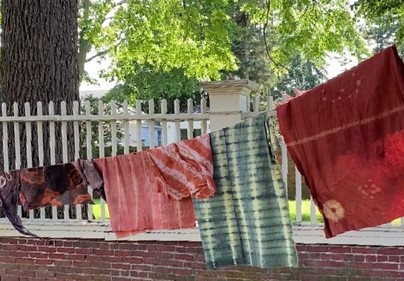 Last summer, artist Stephen Hamilton collaborated with our museum to offer Reclaiming Our Hands, a 7-week program to teach African textile arts to Black students from throughout greater Boston. Students learned sewing, weaving, and appliqué embroidery. Using the black walnut trees on the museum’s land, they learned how to work with natural dyes to create beautiful tie-and-dye tapestries. And from Kyera Singleton, our executive director, they learned the relationships of these traditional textile art forms with histories of slavery in the Americas.
Last summer, artist Stephen Hamilton collaborated with our museum to offer Reclaiming Our Hands, a 7-week program to teach African textile arts to Black students from throughout greater Boston. Students learned sewing, weaving, and appliqué embroidery. Using the black walnut trees on the museum’s land, they learned how to work with natural dyes to create beautiful tie-and-dye tapestries. And from Kyera Singleton, our executive director, they learned the relationships of these traditional textile art forms with histories of slavery in the Americas.
Join us in celebrating the work of nine student artists who participated in this program. This event is co-sponsored by Harvard’s Hutchins Center for African & African American Research and the History Design Studio at the Hutchins Center.
How to participate: The opening will take place in the Rudenstine Gallery, Hutchins Center, 102 Mount Auburn Street, Floor 3R, Cambridge, Mass. The gallery is open to the public Tuesdays-Fridays, 10am-4pm.
Out of Breath: Slavery, Ventilation, and the Emergence of Epidemiology
In-Person Program. Wednesday, April 24 from 6:30 – 8:00 p.m. 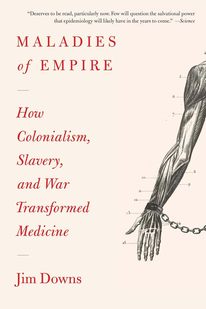
Our keynote speaker will be Dr. Jim Downs, author of Maladies of Empire: How Colonialism, Slavery, and War Transformed Medicine.
A deeply interdisciplinary scholar of race, gender, slavery, epidemiology, climate, and the history of medicine, Dr. Downs has advised Tufts’ new initiative on Slavery, Colonialism, and their Legacies at Tufts. As the Gilder Lehrman-National Endowment for the Humanities Professor of Civil War Era Studies and History at Gettysburg College, Dr. Downs’ work has been published in Science, Nature, and The Lancet.
He will be joined in conversation by Tufts scholars Dr. Ndidiamaka Amutah-Onukagha, Dr. Kerri Greenidge, and Dr. Kendra Field, and hosted by our executive director Kyera Singleton. This program is co-sponsored by the Tufts University Center for the Study of Race and Democracy, the Center for the Humanities at Tufts, and the Tufts Center for Black Maternal Health and Reproductive Justice.
Poetry as Protest: Courtney Faye Taylor’s Concentrate
“This is not the cold archival work of gathering facts from acid-free boxes but archive as grieving, improvisation, autobiography and kinship.” — Ryan Lee Wong, Los Angeles Times.
“Concentrate should be required reading for anyone who seeks to commit themselves to Black-Asian solidarity as theory and/or practice. This is a major work, a profoundly moving anti- erasure crafted with equal parts ingenuity and care.” — Franny Choi, author of The World Keeps Ending, and the World Goes On.
In Concentrate: Poems, Courtney Faye Taylor explores the under-told history of the murder of Latasha Harlins — a fifteen-year-old Black girl killed by Korean American shopkeeper, Soon Ja Du, after being falsely accused of shoplifting a bottle of orange juice.
Concentrate displays an astounding breadth of form and experimentation in found texts, micro- essays, and visual poems, merging worlds and bending time in order to interrogate inexorable encounters with American patriarchy and White supremacy manifested as sexual and racially charged violence. These poems demand absolute focus on Black womanhood’s relentless refusal to be unseen, even and especially when such luminosity exposes an exceptional vulnerability to harm and erasure. Taylor’s inventive, intimate book radically reconsiders the cost of memory, forging a path to a future rooted in solidarity and possibility.
About the Poet: Courtney Faye Taylor is a writer and visual artist. She is the author of Concentrate (Graywolf Press, 2022), which was selected by Rachel Eliza Griffiths as the winner of the Cave Canem Poetry Prize and named a finalist for the 2023 NAACP Image Awards. Courtney earned her BA from Agnes Scott College and her MFA from the University of Michigan Helen Zell Writers’ Program where she received the Hopwood Prize in Poetry.
The Souls of Womenfolk: A Conversation with Alexis Wells-Oghoghomeh
In-Person Public Program. Thursday, February 8 from 6:30 – 8:00 PM.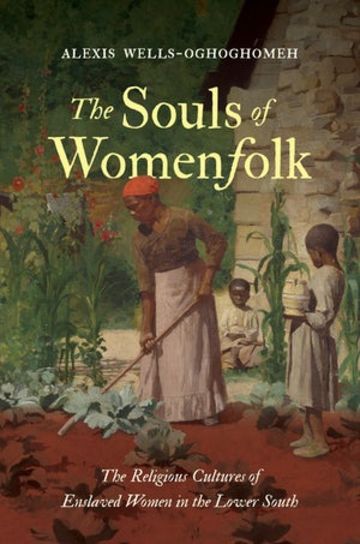
From the shores of West Africa in the sixteenth century to the U.S. Lower South on the eve of the Civil War, Alexis Wells-Oghoghomeh traces a bold history of the interior lives of bondwomen as they carved out an existence for themselves and their families amid the horrors of American slavery. With particular attention to maternity, sex, and other gendered aspects of women’s lives, The Souls of Womenfolk: The Religious Cultures of Enslaved Women in the Lower South documents how bondwomen crafted female-centered cultures that shaped the religious consciousness and practices of entire enslaved communities.
About the Author: Alexis Wells-Oghoghomeh is an Assistant Professor of Religious Studies at Stanford University whose teaching and research explore the intersections of race, religion, and gender in the United States. A historian of African-American religion, she specializes in the religiosity of enslaved people in the South, religion in the African Atlantic, and women’s religious histories.
This program is co-sponsored by Tufts University through the Center for Humanities (CHAT) and by Shiloh Baptist Church in Medford, Massachusetts.
Reclaiming Our Hands
Tufts University. Monday, November 13 from 4:00 – 6:00 PM. 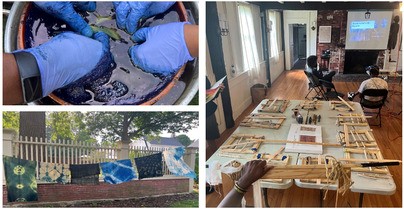
Over the summer, artist Stephen Hamilton collaborated with our museum to offer “Reclaiming Our Hands,” a 7-week program to teach African textile arts to Black students from throughout greater Boston.
Tufts University’s Center for the Study of Race and Democracy will host a conversation with Stephen and our executive director Kyera Singleton about the program. Join us to see what the students produced over the course of the summer and to learn more about the intersection of public history, northern slavery, and Black cultural production.
JustFlix & Sankofa vs. Veritas
In-Person Program. Thursday, November 16 from 6:00 – 8:00 PM. 
The Royall House and Slave Quarters is proud to present a screening of student work from the Medford Housing Authority’s JustFlix program. Over the course of the year, the museum served as a partner and fiscal sponsor for this program, through which students learned about the history of slavery, national social justice movements, and local community activism. The screening showcases the short films students created about their ideas of justice in their communities and beyond, using their cellphones.
After students showcase their work, activist Tamara Lanier will give a talk on the role of social justice and community activism in the quest to preserve her own family’s history.
Enslavement and Resistance: New England 1620-1760

Online & In-Person Special Collaboration. Six programs from October 18 to December 6.
Far from being a land of free labor, Massachusetts enslaved people from its very first years. What was the scope of New England slavery, and how did it expand from wartime plunder to economic foundation? How did enslaved Indigenous and African people resist and in turn influence their new society?
Our friends at the Partnership of Historic Bostons will host a series of five free, eye-opening presentations uncovering the origin stories and spread of slavery in New England. Join award-winning historians including Margaret Newell, Jared Hardesty, Linford Fisher, Indigenous representatives, and others in exploring this story at a time when the topic of slavery is more contested than ever. Online or in-person and live-streamed.
In addition, on Saturday, November 4, 10am-12noon, executive director Kyera Singleton will lead a a compelling in-person tour of our museum to expose how at least 60 enslaved women, men, and children lived and worked, and how their stories are forever linked to the wealth and bondage in colonial and pre-Revolutionary Massachusetts and beyond to the present day.
Acorns & Octavia: A Workshop with Kaitlin Smith
In-Person Public Program. Sunday, October 22 from 1:00 – 3:00 PM. 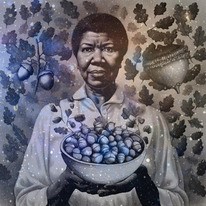
Did you know that you can eat acorns and that they’re incredibly nutritious? Did you know that Octavia Butler wanted us to eat acorns, too?
This event on the museum grounds will invite participants into the fun, fascinating, and filling (!) world of acorn harvesting, processing, and consumption. We will also learn about the Afrofuturist thought and writing of science fiction author Octavia Butler, who wanted us to know how acorns can be a vessel of liberation.
Kaitlin Smith is a scholar, writer, and public humanist-naturalist who runs Storied Grounds, a venture that delivers unique place-based educational experiences and tools informed by folk knowledge and humanistic ideas. Kaitlin is a PhD student at Harvard in History of Science.
Black Walnut Tie-Dye Workshop with Textile Artist Stephen Hamilton
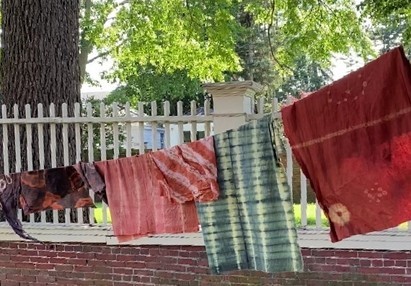 In-Person Public Program. Saturday, November 4 from 1:00 – 4:00 PM.
In-Person Public Program. Saturday, November 4 from 1:00 – 4:00 PM.
Textile artist and arts educator Stephen Hamilton will lead this hands-on workshop for teens and adults, using abundant black walnuts growing on the museum grounds to explore African tie-dye techniques.
As a Black American trained in traditional west African artforms, Stephen Hamilton treats the acts of weaving and dyeing as ritualized acts of reclamation. He uses traditional techniques and materials native to West Africa to reclaim ancestral knowledge dissociated from Africans in the Americas during the transatlantic slave trade. A graduate of the Massachusetts College of Art and Design, he has exhibited his work throughout Greater Boston and and was part of MFA Boston’s recent “Touching Roots: Black Ancestral Legacies in the Americas” exhibition.
Reading Frederick Douglass Together at the Royall House and Slave Quarters
In-Person Public Program. Tuesday, July 4, 12:00 – 2:00 PM.
 We are excited to host our first-ever Reading Frederick Douglass Together program on the museum grounds in Medford on Tuesday, July 4th.
We are excited to host our first-ever Reading Frederick Douglass Together program on the museum grounds in Medford on Tuesday, July 4th.
The Royall House and Slave Quarters has received a generous grant for this program from Mass Humanities with funding made possible by the Mass Cultural Council.
We invite community members to gather on the lawn in front of the historic Slave Quarters building to read/listen to Douglass’s “What, To The Slave, is the Fourth of July?” to honor the long history of Black activism, critique, and abolition.
We will begin the program with a libation ceremony to honor the people who were enslaved on the plantation. Scholar/activist David Harris and members of the Mystic Valley Area NAACP will launch the reading, then invite community members to read sections of the speech.
A poetry reading by Terry E. Carter, Medford’s Poet Laureate Emeritus, will close out the program.
After the event, we invite community members to an open house inside the Royall House and the Slave Quarters. Light refreshments will be provided.
Teaching White Supremacy: A Conversation with Donald Yacovone
In-Person Public Program. Thursday, April 13, from 7:30 – 8:30 p.m. 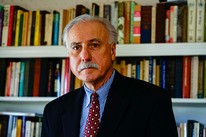
In Teaching White Supremacy, historian Donald Yacovone shows us the clear evidence of white supremacy’s deep-seated roots in our nation’s educational system through a fascinating, in-depth examination of America’s wide assortment of texts, from primary readers to college textbooks, from popular histories to the most influential academic scholarship. Sifting through a wealth of materials from the colonial era to today, the author reveals the systematic ways in which this ideology has infiltrated all aspects of American culture and how it has been at the heart of our collective national identity.
About the Speakers: Dr. Donald Yacovone is an associate at the Hutchins Center for African and African American Research, Harvard University. He will be joined in conversation by David J. Harris, emeritus managing director of the Houston Institute at Harvard Law School.
Remembering Belinda Sutton: Resistance, Activism, and Reparations
In-Person Public Program. Saturday, February 25th from 1:00 – 3:30 p.m.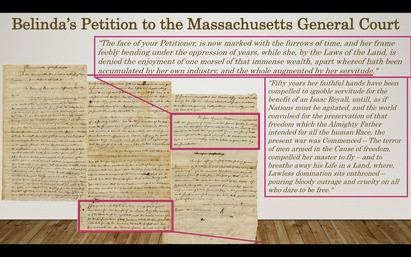
In honor of Black History Month’s theme of Black Resistance, we hosted a reading and discussion of Belinda Sutton’s 1783 Pension Petition. The program included poetry by Medford’s own Terry Carter, a musical performance by local group Tufts S-Factor and Janey David.
Sponsored by the City of Medford’s Human Rights Commission, the event included an optional free tour of the museum.
The Grimkes: The Legacy of Slavery in an American Family
Co-sponsored, in-person program | Thursday, December 1 | 6:00 – 7:00 p.m.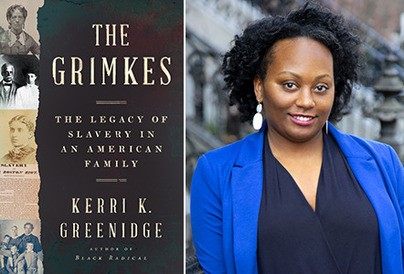
This program is part of the Longfellow House Washington’s Headquarters National Historic Site’s Fall Lecture Series. We are delighted to co-sponsor it with them and the Boston African American National Historic Site.
Dr. Kerri Greenidge will discuss her newly released book The Grimkes: The Legacy of Slavery in an American Family, cited by the New York Times as one of “15 Works of Nonfiction to Read This Fall.”
Sarah and Angelina Grimke — the Grimke sisters — are revered figures in American history, famous for rejecting their privileged lives on a plantation in South Carolina to become firebrand activists in the North. Yet, retellings of their epic story have long obscured their Black relatives. In The Grimkes, award-winning historian Kerri Greenidge presents a parallel corrective narrative, shifting the focus from the white abolitionist sisters to the Black Grimkes and deepening our understanding of the long struggle for racial and gender equality.
Dr. Greenidge is the Andrew W. Mellon Assistant Professorship of Race, Colonialism, and Diaspora at Tufts University, where she also serves as track director for American Studies and as co-director of the African American Trail Project.
Somerville Museum: Reading Frederick Douglass Together
Thursday, June 30, 4:30 – 6:00 p.m. 
Each year Mass Humanities supports public readings around the Commonwealth of Frederick Douglass’s influential address, “What to the Slave is the Fourth of July?”
In his fiery July 5, 1852 speech, Douglass took exception to being asked to commemorate the signing of the Declaration of Independence, reminding his audience that “the rich inheritance of justice, liberty, prosperity and independence, bequeathed by your fathers, is shared by you, not by me.”
Readings and follow-up discussions take many forms, but each event features a group of people gathered to read parts of the speech. This year’s readings began in mid-June and continue through July 5th. Visit the Mass Humanities website for an event list, and click through each individual link for local details.
If you’re in this area, please join the Somerville Museum at Bow Market in Union Square for their annual reading. The reading will be followed by a discussion led by the Somerville Museum’s Project Scholar, Kyera Singleton, executive director of our museum in adjacent Medford. This event is free and all are encouraged to attend and participate. Please RSVP through this link to receive updated details and information.
Boston Athenaeum’s “A Lynching at Port Jervis: Race and Reckoning in the Gilded Age”
Online Speaking Engagement: Wednesday, May 25, from 7:00 – 8:00 P.M.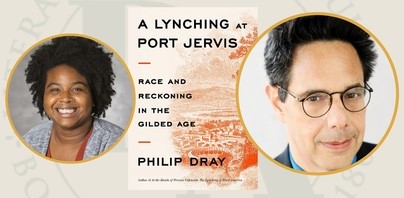
On June 2, 1892, in the small, idyllic village of Port Jervis, New York, a young Black man named Robert Lewis was lynched by a violent mob.
The incident was infamous at once, for it was seen as a portent that lynching, a Southern scourge, surging uncontrollably below the Mason-Dixon Line, was about to extend its tendrils northward.
What factors prompted such a spasm of racial violence in a relatively prosperous, industrious upstate New York town, attracting the scrutiny of the Black journalist Ida B. Wells, just then beginning her courageous anti-lynching crusade? What meaning did the country assign to it? And what did the incident portend?
In A Lynching at Port Jervis, the acclaimed historian Philip Dray revisits this time and place to consider its significance in our communal history and to show how justice cannot be achieved without an honest reckoning. The author will be in conversation with Kyera Singleton, our museum’s executive director.
Confronting Racial Injustice: Rising Asian American Voices
Co-Sponsored Online Program: Thursday, May 26, 6:00 – 7:00 p.m.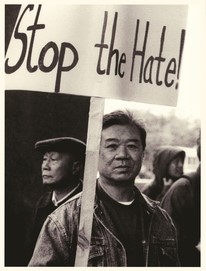
Anti-Asian violence is not new. Join us for a conversation about the history of racial violence against Asian Americans and the recent rise of Asian American voice.
Panelists include Paul Lee, Goodwin Proctor; Phil Tajitsu Nash, Asian American Legal Defense and Education Fund; The Honorable Tram Nguyen, Massachusetts State Representative, 18th Essex District; with pre-recorded remarks by Boston Mayor Michelle Wu, and moderated by The Honorable Catherine Ham, Associate Justice, Massachusetts Superior Court.
Developed by the Northeastern University School of Law Criminal Justice Task Force, Confronting Racial Injustice is a free series hosted by the Massachusetts Historical Society and sponsored by a number of Boston-area organizations.
Artifacts of Slavery: Confronting Slavery and the Making of Boston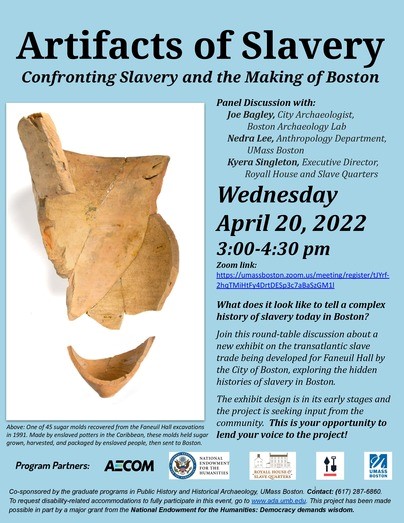
Co-Sponsored Online Program: Wednesday, April 20, 2022 from 3:00 – 4:30 p.m.
What does it look like to tell a complex history of slavery today in Boston?
Join this online round-table discussion seeking community input about a new exhibit on the transatlantic slave trade being developed for Faneuil Hall by the City of Boston, exploring the hidden histories of slavery in Boston.
Panelists include Boston City Archaeologist Joe Bagley, UMass Boston Assistant Professor of Anthropology Nedra Lee, and Royall House and Slave Quarters Executive Director Kyera Singleton.
Confronting Economic Injustice: the Story of Parcel C
Co-Sponsored Online Program: Thursday, April 28, 2022 from 6:00 – 7:00 p.m.
Boston’s Chinatown has long been the physical, economic, and cultural center for Chinese immigrants. Chinatown has also long fought for community control of affordable housing and economic justice. Join us for a conversation about the story of Parcel C, Chinatown’s success in fighting against institutional expansion and reclaiming this parcel for community use.
Panelists include Michael Liu, Author of Forever Struggle: Activism, Identity and Survival in Boston’s Chinatown; David Moy, Hyams Foundation; Lydia Lowe, Chinatown Community Land Trust; and Carolyn Chou, Asian American Resource Workshop, and the moderator is Margaret Woo, Northeastern University School of Law.
Developed by the Northeastern University School of Law Criminal Justice Task Force, Confronting Racial Injustice is a free series hosted by the Massachusetts Historical Society and sponsored by a number of Boston-area organizations.
Telling the Truth About All This: Reckoning with Slavery and its Legacies at Harvard and Beyond
Co-Sponsored Online Program: Friday, April 29, 2022 from 9:15 a.m. – 6:00 p.m.
 This program is presented as part of the Presidential Initiative on Harvard and the Legacy of Slavery, a University-wide effort anchored at Harvard Radcliffe Institute.
This program is presented as part of the Presidential Initiative on Harvard and the Legacy of Slavery, a University-wide effort anchored at Harvard Radcliffe Institute.
Over the past two decades, universities around the world have begun to engage with their legacies related to slavery. Many have issued reports detailing some of their historical ties to slavery, the substantial financial benefits the institutions and their affiliates extracted from slave economies, and universities’ intellectual contributions to racist ideologies and practices.
At the same time, this research has uncovered a long history of African American resistance, and we are just beginning to address the impact of legacies of slavery on Black students at these institutions into the 21st century.
With this history uncovered, we must now ask: What must institutions of higher education do? What types of repair work can and should we undertake? We will explore these questions in our conference through discussions about a range of topics, including engagement with descendant communities, legacies of slavery in libraries and museums, and novel public engagement and educational opportunities.
Visit the registration link for the day’s full schedule and information on speakers.
Built with Empty Fists: Black Liberation through Martial Arts
 Join us for a workshop by Dr. Maryam Aziz that explores how martial arts became a significant form of self determination for Black communities. Dr. Aziz will provide a historical overview that shows how self-defense moves can be traced back to the Reconstruction period while focusing on how unarmed self-defense contributed to Black Power organizing and shifting ideas about liberation, abolition, and gender norms from the Cold War to our present moment. This workshop will be interactive with Dr. Aziz highlighting and breaking down the importance of several moves from Tae Kwon Do and Jeet Kun Do.
Join us for a workshop by Dr. Maryam Aziz that explores how martial arts became a significant form of self determination for Black communities. Dr. Aziz will provide a historical overview that shows how self-defense moves can be traced back to the Reconstruction period while focusing on how unarmed self-defense contributed to Black Power organizing and shifting ideas about liberation, abolition, and gender norms from the Cold War to our present moment. This workshop will be interactive with Dr. Aziz highlighting and breaking down the importance of several moves from Tae Kwon Do and Jeet Kun Do.
Maryam Aziz (they/them) is a Postdoctoral Fellow in the Richards Center and the Africana Research Center at Pennsylvania State University. Aziz received a Ph.D. in American Culture from the University of Michigan and also holds a Bachelor of Arts Degree in African American Studies from Columbia University.
Aziz’s work was showcased in the 2017-2018 exhibit Black Power! at the Schomburg Center for Research in Black Culture, for which Aziz was a contributing writer and a curator for the sections on popular culture and blaxploitation film. As a scholar activist, Aziz regularly teaches radically inclusive self-defense classes in person and now virtually.
Feeding the Nation: Michael W. Twitty on American Foodways and the History of Enslavement
Co-sponsored virtual program. Thursday, March 24, 2022 from 4:00 – 5:00 p.m.
 Michael W. Twitty — food writer, independent scholar, culinary historian, and historical interpreter — is the author of the Afroculinaria blog and The Cooking Gene: A Journey Through African American Culinary History in the Old South.
Michael W. Twitty — food writer, independent scholar, culinary historian, and historical interpreter — is the author of the Afroculinaria blog and The Cooking Gene: A Journey Through African American Culinary History in the Old South.
He will discuss his insights about the role of enslaved people in shaping American foodways, as well as the critical importance of including stories of the enslaved prominently in public history and historical interpretation.
Following his remarks, Twitty will be joined in conversation by Tomiko Brown-Nagin, dean of the Harvard Radcliffe Institute and chair of the Presidential Committee on Harvard and the Legacy of Slavery.
We are honored to co-sponsor this program.
Abolitionists in Action: Transformative Justice and the University
 Save the Date: Thursday, April 14, 2022 at 6:00 p.m.
Save the Date: Thursday, April 14, 2022 at 6:00 p.m.
Watch this space for more details on an exciting program featuring Mariame Kaba, author of We Do This ‘Til We Free Us and founding member of Project NIA, Survived and Punished, and the Chicago Freedom School. She will be joined by Dara Kwayera Imani Bayer and Camila Pelsinger, both from Brown University’s Transformative Justice Practitioner Program, and Sofia Meadows of Unity Circles.
We are honored to co-sponsor this event with the Charles Warren Center for Studies in American History, MINDICH Program for Engaged Scholarship, The Abolition Collaboratory, Mahindra Humanities Center, the Prison Studies Project, and Phillips Brooks House Association.
WBUR – Newsmakers: Addressing the Legacies of Systemic Racism in National Monuments
Thursday, March 3, 2022 at 6:30 p.m. Both in-person, and virtual.
 Across the south, monuments associated with the Confederacy have toppled as protests against the murder of George Floyd, police brutality, and racial injustice took over cities around the world. These moments act as catalysts by removing white supremacist imagery from the landscape and making space to reimagine how we memorialize history.
Across the south, monuments associated with the Confederacy have toppled as protests against the murder of George Floyd, police brutality, and racial injustice took over cities around the world. These moments act as catalysts by removing white supremacist imagery from the landscape and making space to reimagine how we memorialize history.
Join WBUR’s Morning Edition host Rupa Shenoy in conversation with arts and culture reporter Cristela Guerra and photographer Jennifer Ortiz in a photo-rich, immersive discussion about their journey to three cities where Confederate monuments once stood and, in some cases, where new monuments currently stand.
Kyera Singleton, our executive director, will help answer the question: What can the north learn from the south in navigating this crucial moment and how we as a country often clarify history to catch up with culture?
How to Participate: The in-person program will take place at WBUR CitySpace, 890 Commonwealth Avenue in Boston. Doors open at 6pm. All in-person attendees will be required to show proof of vaccination and wear masks.
Both in-person admission and online access are free, but registration is required.
Online Public Programs: Poetry as Protest – Medford Poet Laureate Terry E. Carter
Thursday, February 24, 2022 from 6:00 – 7:00 p.m.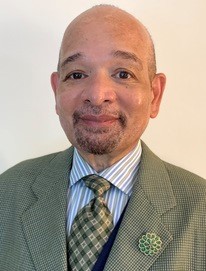
Terry E. Carter named last year as our home community’s inaugural Poet Laureate, will read and discuss a selection of his poems relating to the history and legacies of slavery in Medford, Massachusetts, and beyond, but also about Black resistance and joy. His reading will include “Medford Bound,” the powerful poem he wrote for the dedication of a memorial to enslaved Medford residents buried in unmarked graves in the city’s oldest cemetery.
 A classically-trained poet whose literary influences range from Shakespeare to the Harlem Renaissance, Terry has published five volumes of poetry, including most recently his 2020 book, Brown Skin and the Brave New World: A Poet’s Anthem. He was born and raised in Medford and educated in the Medford Public Schools.
A classically-trained poet whose literary influences range from Shakespeare to the Harlem Renaissance, Terry has published five volumes of poetry, including most recently his 2020 book, Brown Skin and the Brave New World: A Poet’s Anthem. He was born and raised in Medford and educated in the Medford Public Schools.
Vijaya Sundaram will serve as Interlocutor for this conversation. She is a Medford-based poet, song-writer, singer, and teacher of East Indian origin.
This program is supported in part by a grant from the Medford Arts Council, a local commission that is supported by the Mass Cultural Council and the City of Medford.
Until I Am Free: Fannie Lou Hamer’s Enduring Message to America
Wednesday, March 2, 2022 from 7:30 to 8:30 p.m.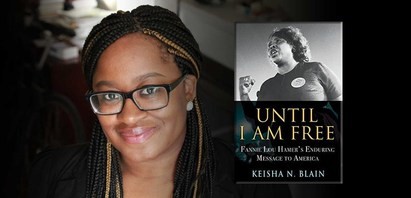
“Keshia Blain’s magnificent Until I Am Free introduces us to Hamer the political thinker, the strategist and theorist, the internationalist whose expansive vision of freedom embraced the oppressed everywhere. A pathbreaking contribution to our history and a precious guide for today’s activists fighting for the world Hamer envisioned.” — Robin D. G. Kelley, author of Freedom Dreams: The Black Radical Imagination.
Historian Keisha N. Blain‘s book challenges us to listen to Fannie Lou Hamer, a former sharecropper who was a working-poor and disabled Black woman activist and intellectual of the civil rights movement, as we grapple with contemporary concerns around race, inequality, and social justice.
 Dr. Blain is a historian of the 20th-century United States specializing in African American history, the modern African diaspora, and women’s and gender studies. She is the author of the multi-prize-winning book Set the World on Fire and co-editor, with Ibram X. Kendi, of the #1 New York Times bestseller Four Hundred Souls. She is an associate professor of history at the University of Pittsburgh, president of the African American Intellectual History Society, and a columnist for MSNBC.
Dr. Blain is a historian of the 20th-century United States specializing in African American history, the modern African diaspora, and women’s and gender studies. She is the author of the multi-prize-winning book Set the World on Fire and co-editor, with Ibram X. Kendi, of the #1 New York Times bestseller Four Hundred Souls. She is an associate professor of history at the University of Pittsburgh, president of the African American Intellectual History Society, and a columnist for MSNBC.
This program is supported by a grant from the Bridge Street Fund, a special initiative of Mass Humanities.
Upcoming Online Speaking Engagement: Massachusetts Historical Society – Challenging Assumptions in Telling Underrepresented History
Wednesday, February 9, 2022 from 6:00 – 7:00 p.m.
Too often public history organizations have believed that there were not enough records to give voice to enslaved people and other underrepresented voices from America’s past. 
This Massachusetts Historical Society program will feature three projects at historical organizations that have been able to tell the stories of enslaved people. These projects show that with research and persistence, the stories of all of Massachusetts’s residents can be shared.
Kyera Singleton, our museum’s Executive Director, will join Cynthia Cowan, Historic Newton; Stacen Goldman, Framingham History Center; and Barbara Brown, Hidden Brookline, for this panel discussion.
Co-Sponsored Online Program: Collecting and Exhibiting Untold Stories
Saturday, February 19, 2022 from 1:00 – 2:00 p.m. 
We are pleased to co-sponsor this program, which is part of the Cape Ann Museum’s CAMTalks series.
What responsibility do museums have to actively collect and exhibit Black history? How can this responsibility be fulfilled through collaborative exhibition practices.
Doneeca Thurston, Director of the Lynn Museum, will share the conception, collection, and implementation of the museum’s collaborative exhibit with Lynn’s Black community, entitled “Untold Stories: A History of Black People in Lynn.” She will be joined by Kyera Singleton, our museum’s Executive Director, to discuss the growth and change of both institutions.
Reckoning with Remembrance
Tuesday, November 30, 2021 from 6:30 to 7:30 p.m.
Join us for a discussion with Tsione Wolde-Michael, one of the curators of the recent exhibit “Reckoning with Remembrance: History, Injustice, and the Murder of Emmet Till” at the National Museum of American History. 
The new exhibit features a single object, the 2008 historical marker commemorating Emmet Till, which was vandalized over the course of many years and contains 317 bullet holes.
Tsione will discuss the complicated relationship between Black history and national belonging.
About the Speaker: Tsione Wolde-Michael is a Curator of African American Social Justice History at the Smithsonian National Museum of American History, where she also serves as Director for the Center for Restorative History. Her work focuses on redress and restorative justice in museums through innovative approaches to community engagement, collections management, cultural heritage, and exhibitions. Tsione’s decade-long work in the field of public history includes the landmark Slavery and Freedom exhibition at the National Museum of African American History and Culture.
 This program is supported by a grant from the Bridge Street Fund, a special initiative of Mass Humanities.
This program is supported by a grant from the Bridge Street Fund, a special initiative of Mass Humanities.
Poets on Craft: Interrogating Legacies of Slavery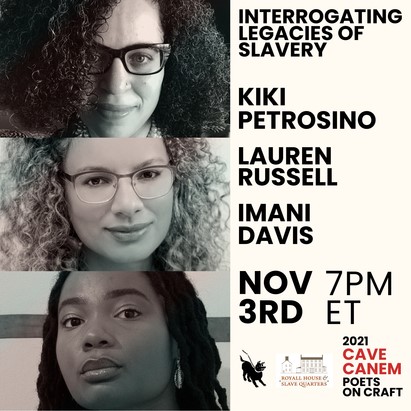
Wednesday, November 3, 2021 from 7:00 – 8:30 p.m.
We are delighted to sponsor this online program with Cave Canem Foundation, a home for the many voices of African American poetry that is committed to cultivating the artistic and professional growth of African American poets.
Poets Kiki Petrosino (White Blood: A Lyric of Virginia) and Lauren Russell (Descent) will discuss their process of writing about family histories, exploring legacies of slavery, and utilizing archival research methods in their poetry. The conversation will be moderated by poet and Harvard graduate student Imani Davis. Learn more about these artists on the Eventbrite page.
How to participate: Attendance is free, but registration is required. This program is supported by a grant from the Bridge Street Fund, a special initiative of Mass Humanities.
Crossroads in Community: What “Then” Says to Us “Now”
We are honored to co-sponsor this series of three programs with our neighbors at the Medford Historical Society & Museum and the West Medford Community Center. The series is supported in part by a grant from the Medford Arts Council, a local commission that is supported by the Mass Cultural Council and the City of Medford. Attendance is free, but please note that separate registration is required for each program:
Royall House and Slave Quarters Virtual Tour: A View of the African American Presence in Colonial Medford
Thursday, October 21, 2021 from 7:00 – 8:30 p.m.
In the 18th century, some 60 women, children, and men were enslaved on a plantation five miles north of Boston. This program will feature a 40-minute guided tour of the Royall mansion and the only known freestanding Slave Quarters in the northeast, followed by a live Q&A with museum executive director Kyera Singleton about how this history resonates today.
West Medford, Then and Now: A Roundtable Conversation with Members of the Local Community
Friday, October 29, 2021 from 7:00 – 8:30 p.m.
Long-time West Medfordite Neil Osborne joins a diverse group of residents in an important discussion of the neighborhood’s past, present, and future. The provocative roundtable conversation hopes to hold a mirror up to the city-wide issues of culture, gentrification, community preservation, social justice, diversity, and the evolution of neighborhoods over time.
Pride and Poetry of the Ville: An Evening with Medford’s Poet Laureate and Friends
Friday, November 5, 2021 from 7:00 – 8:30 p.m.
Medford’s inaugural Poet Laureate and local favorite son Terry E. Carter is joined by several artistic comrades and fellow poets in a savory artistic salute to the historic and dynamic community of West Medford. Carter and friends will explore the unique culture, continuity, and challenge of change to this vibrant Medford neighborhood.
Slavery at Roxbury’s Shirley Place: A Working Report
Tuesday, October 12, 2021 from 7:00 – 8:30 p.m.
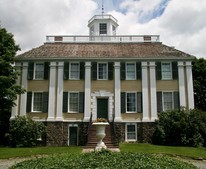 We are pleased to co-sponsor this online program with the Shirley-Eustis House Association.
We are pleased to co-sponsor this online program with the Shirley-Eustis House Association.
Shirley Place in the Roxbury neighborhood of Boston was built in 1747 by Massachusetts Royal Governor William Shirley as his seasonal country estate. It was recently designated a Boston Landmark.
Aabid Allibhai, PhD candidate in Harvard University’s African and African-American Studies program, will discuss his research into the enslaved people who served Governor Shirley and his daughter Elizabeth Shirley Hutchinson. Kyera Singleton, Executive Director of the Royall House and Slave Quarters, will explore the role of historic sites in engaging with the history of slavery, now and in the future.
Co-Sponsored Program: Reading Frederick Douglass Together
Friday, July 9, 2021 at 12:00 p.m.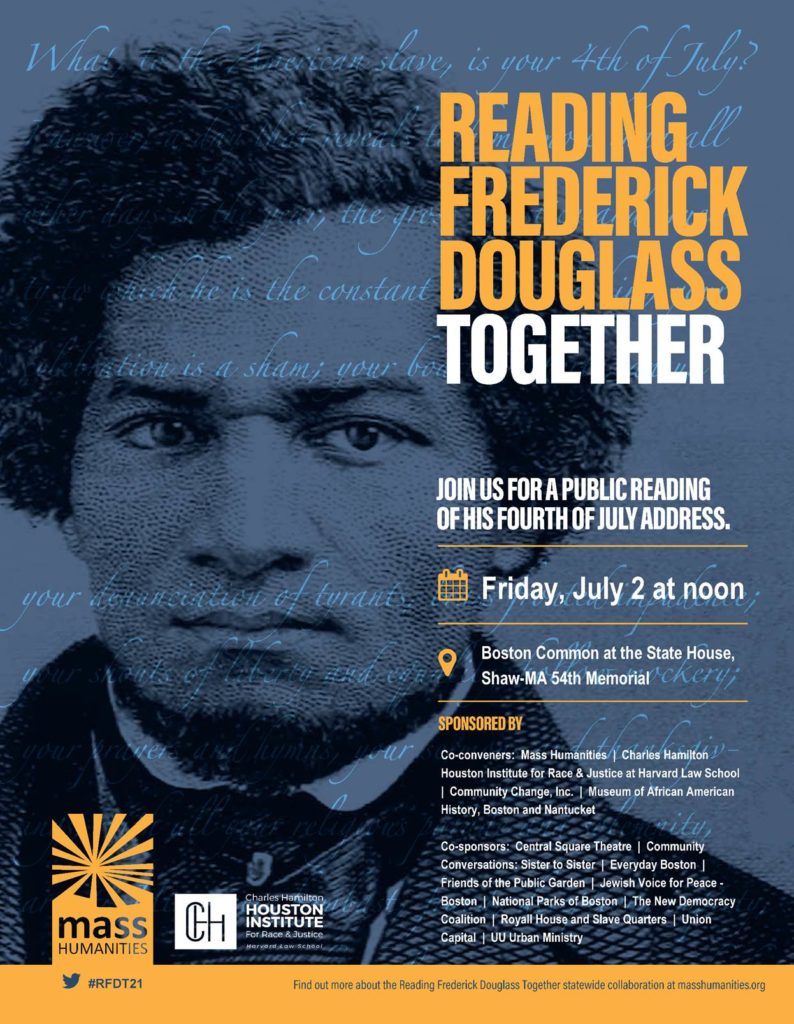
This year’s 13th annual communal reading of Frederick Douglass’ 1852 speech, “What to the Slave is the Fourth of July?” is back in person! Part of a series of statewide events hosted by Mass Humanities, the reading provides an opportunity to open up discourse between community members about race, rights, and our responsibilities to the past and to reach other.
Members of the public will take turns reading parts of the speech until they’ve read all of it, together. Everyone is welcome to read; this event is free and open to the public.
Co-Sponsored Program: Force and Freedom: Black Abolitionists and the Politics of Violence
Tuesday, July 13, 2021 at 6:00 p.m.
In Force and Freedom, Kellie Carter Jackson provides the first historical analysis exclusively focused on the tactical use of violence among antebellum black activists. Through rousing public speeches, the burgeoning black press, and the formation of milita groups, black abolitionist leaders mobilized their communities, compelled national action, and drew international attention. Drawing on the precedent and pathos of the American and Haitian Revolutions, African American abolitionists used violence as a political language and a means of provoking social change. Through tactical violence, black abolitionist leaders accomplished what white nonviolent abolitionists could not: creating the conditions that necessitated the Civil War.
Force and Freedom takes readers beyond the honorable politics of moral suasion and the romanticism of the Underground Railroad and into an exploration of the agonizing decisions, strategies, and actions of the black abolitionists who, though lacking an official political voice, were nevertheless responsible for instigating monumental social and political change.
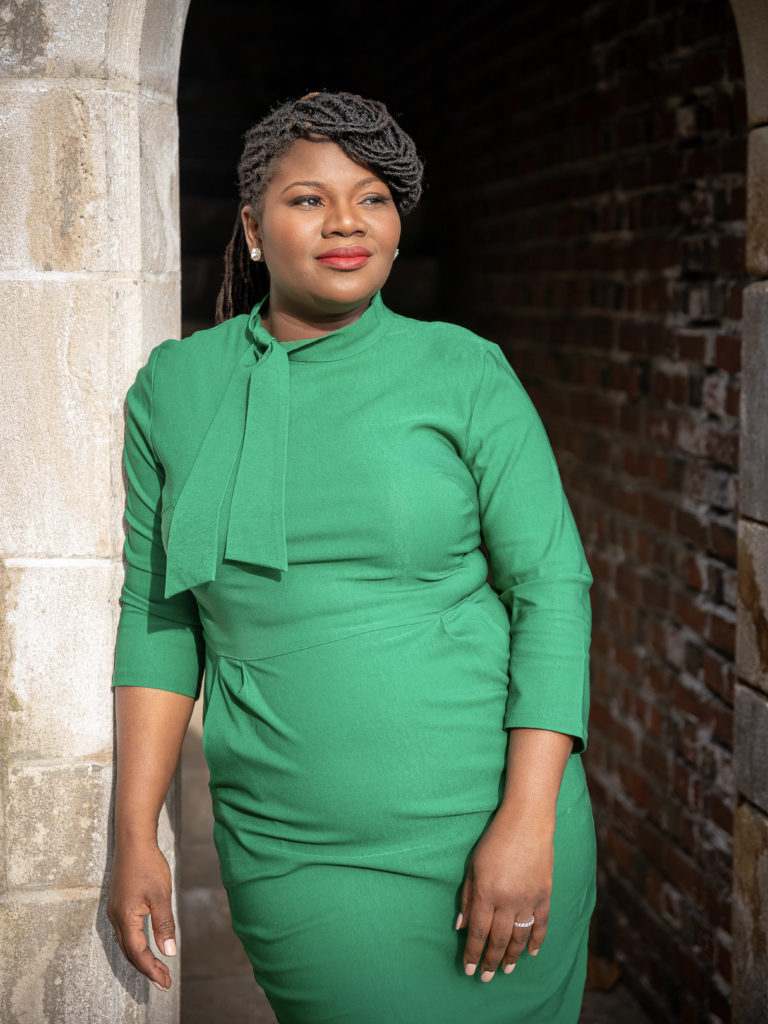 Kellie Carter Jackson is the Knafel Assistant Professor of the Humanities in the Department of Africana Studies at Wellesley College. Force and Freedom won the James H. Broussard Best First Book Prize, is a finalist for the Frederick Douglass Book Prize, a finalist for the Museum of African American History Stone Book Prize, and listed among 13 books to read on African American History by the Washington Post. Carter Jackson is also co-editor of Reconsidering Roots: Race, Politics, & Memory. With a forward written by Henry Louis Gates, Jr., Reconsidering Roots is the first scholarly collection of essays devoted entirely to understanding the impact of Alex Haley’s Roots. Carter Jackson’s essays have been featured in the Washington Post, The Atlantic, the Los Angeles Times, NPR, Time, The Conversation, Black Perspectives, and Quartz. She has also been interviewed for her expertise for MSNBC, SkyNews (UK), the New York Times, the Guardian, PBS, Vox, Huff Post, C-Span, the BBC, Boston Public Radio, Al Jazeera International, and Slate. She has been featured in a host of documentaries and podcasts on history and race in the United States. Carter Jackson is also a commissioner for the Massachusetts Historical Commission, where she represents the Museum of African American History in Boston. Lastly, she is the co-host of the podcast, “This Day in Esoteric Political History.”
Kellie Carter Jackson is the Knafel Assistant Professor of the Humanities in the Department of Africana Studies at Wellesley College. Force and Freedom won the James H. Broussard Best First Book Prize, is a finalist for the Frederick Douglass Book Prize, a finalist for the Museum of African American History Stone Book Prize, and listed among 13 books to read on African American History by the Washington Post. Carter Jackson is also co-editor of Reconsidering Roots: Race, Politics, & Memory. With a forward written by Henry Louis Gates, Jr., Reconsidering Roots is the first scholarly collection of essays devoted entirely to understanding the impact of Alex Haley’s Roots. Carter Jackson’s essays have been featured in the Washington Post, The Atlantic, the Los Angeles Times, NPR, Time, The Conversation, Black Perspectives, and Quartz. She has also been interviewed for her expertise for MSNBC, SkyNews (UK), the New York Times, the Guardian, PBS, Vox, Huff Post, C-Span, the BBC, Boston Public Radio, Al Jazeera International, and Slate. She has been featured in a host of documentaries and podcasts on history and race in the United States. Carter Jackson is also a commissioner for the Massachusetts Historical Commission, where she represents the Museum of African American History in Boston. Lastly, she is the co-host of the podcast, “This Day in Esoteric Political History.”
Co-Sponsored Program: Book Talk with Clint Smith
Tuesday, July 13, 2021 at 4:00 p.m.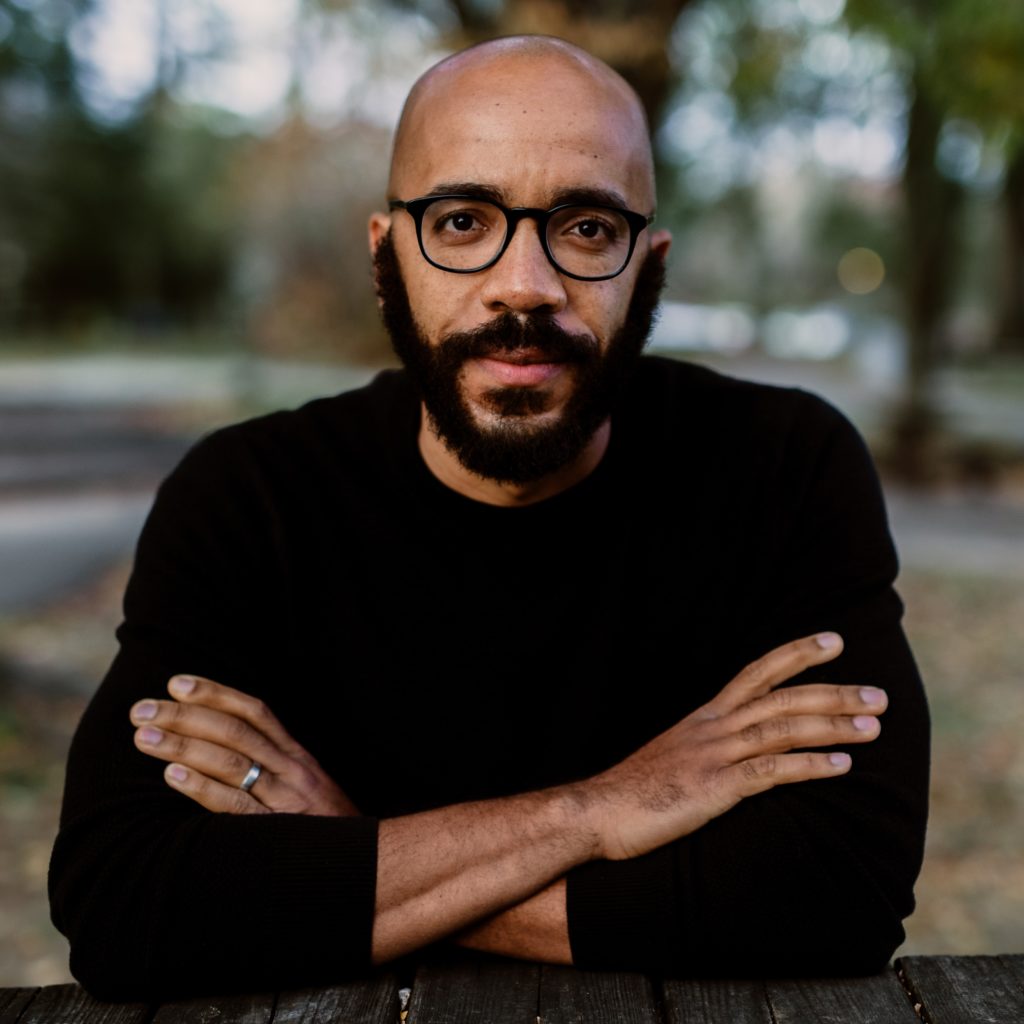
The first installment in Radcliffe’s summer series of Virtual Book Talks will feature Clint Smith, author of How the Word is Passed: a Reckoning with the History of Slavery Across America (Little, Brown and Company, 2021) and staff writer at the Atlantic.
Smith’s reading will be followed by a discussion with our Executive Director, Kyera Singleton. The event will also include audience Q&A.
This program is presented as part of the Presidential Initiative on Harvard and the Legacy of Slavery, a University-wide effort housed at Harvard Radcliffe Institute, in collaboration with Royall House and Slave Quarters.
Speaker: Clint Smith is a staff writer at the Atlantic. He is the author of the recently released narrative nonfiction book How the Word Is Passed: A Reckoning with the History of Slavery across America, which was a number-one New York Times best seller, and the poetry collection Counting Descent, which won the 2017 BCALA Literary Award for best poetry from the Black Caucus of the American Library Association and was a finalist for an NAACP Image Award. He is also the host of the YouTube series Crash Course Black American History.
Smith received his BA in English from Davidson College and his PhD in education from Harvard University.
Live closed captioning will be available for this webinar.
All That She Carried: A Conversation with Tiya Miles
Tuesday, June 22 at 7:00 p.m.
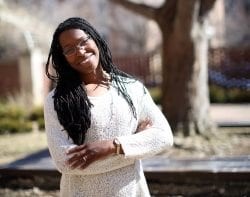
We are delighted to co-sponsor this program with the Concord Museum and The Robbins House.
Join MacArthur Fellow and Harvard University Professor Tiya Miles as she discusses her new book, All That She Carried: The Journey of Ashley’s Sack, a Black Family Keepsake, a story about women, mothers, and daughters who chose the profundity of love over dehumanizing condition. At the heart of this moving tale is a rough cotton bag, given by an enslaved woman named Rose to her daughter, Ashley, before their forced separation.
Confronting Racial Injustice –
The War on Drugs in Massachusetts: The Racial Impact of the School Zone Law and Other Mandatory Minimum Sentences
Co-Sponsored Online Public Program: Wednesday, May 19 at 6:00 p.m.
 In the 1980s, Massachusetts embraced the War on Drugs, enacting harsh mandatory minimum sentences for nonviolent drug offenses. It took decades to confront the reality that, in addition to being ineffective and costly, mandatory minimums resulted in the pervasive and disproportionate incarceration of Black and Brown people. Panelists will discuss this troubling history, recent reforms, and the prospects for implementing drug policies that are effective, fair, and just.
In the 1980s, Massachusetts embraced the War on Drugs, enacting harsh mandatory minimum sentences for nonviolent drug offenses. It took decades to confront the reality that, in addition to being ineffective and costly, mandatory minimums resulted in the pervasive and disproportionate incarceration of Black and Brown people. Panelists will discuss this troubling history, recent reforms, and the prospects for implementing drug policies that are effective, fair, and just.
Panelists include Sen. William N. Brownsberger, Second Suffolk & Middlesex District; Abrigal Forrester, Executive Director, Center for Teen Empowerment; Rahsaan D. Hall, Director of the Racial Justice Program, American Civil Liberties Union of Massachusetts; and Deborah A. Ramirez, Professor, Northeastern University School of Law. The discussion will be moderated by Hon. Sydney Hanlon, Massachusetts Appeals Court Speaker.
We are honored to co-sponsor this series of five monthly programs hosted by the Massachusetts Historical Society and Northeastern University Law School’s Criminal Justice Task Force. In June, the final program in this series will address the Charles Stuart story. Videos of past programs are posted to the registration page.
Telling Uncomfortable Histories: the Enduring Legacy of Slavery and Racism in the North
Wednesday, May 12 at 4:30 p.m.
The Malden Public Library presents a series of programs that explore the role of slavery in America’s Founding Era and in our modern world.
Kyera Singleton, Executive Director of the Royall House and Slave Quarters, will speak about “Telling Uncomfortable Histories: The Enduring Legacy of Slavery and Racism in the North” on Wednesday, May 12th.
Prior to Kyera’s presentation, all registered participants will receive a link to our museum’s new 40-minute virtual tour video, giving viewers the chance to explore the Royall House and Slave Quarters virtually, led by guide Lee LaFleur in a video created by videographer Shun Liang. We are grateful to Tides Foundation for their generous support of video production.
The Malden Public Library’s project is funded in part by Revisiting the Founding Era, a four-year national initiative of the Gilder Lehrman Institute of American History presented in partnership with the American Library Association, and the National Constitution Center, with generous support from the National Endowment for the Humanities.
Racial Inequality and Housing Instability in Boston: Past, Present, and Future
Tuesday, April 20, 2021 at 4:00 PM EST
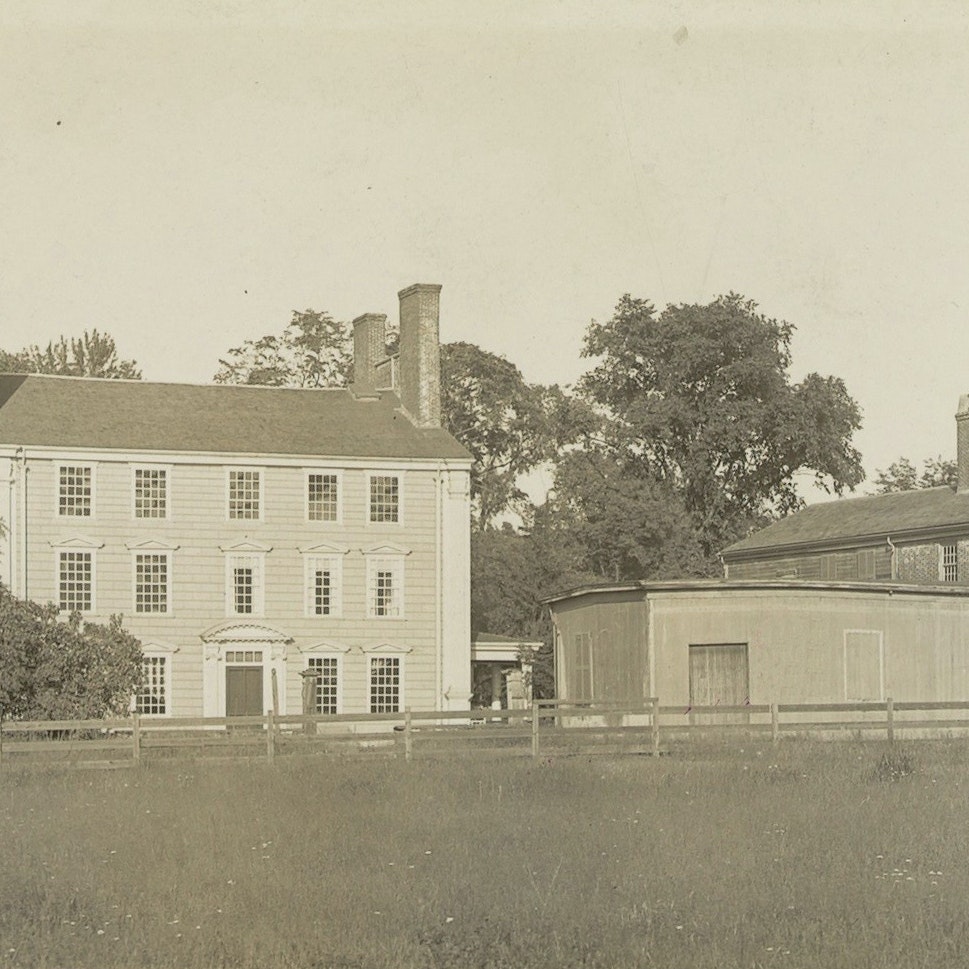 This program is presented as part of the presidential initiative on Harvard and the Legacy of Slavery, a University-wide effort housed at Harvard Radcliffe Institute, and in collaboration with the Harvard Radcliffe Institute.
This program is presented as part of the presidential initiative on Harvard and the Legacy of Slavery, a University-wide effort housed at Harvard Radcliffe Institute, and in collaboration with the Harvard Radcliffe Institute.
Millions of Americans have long struggled to pay for housing, with communities of color additionally burdened by housing discrimination and historical race-based policies, such as legalized segregation, redlining, and mortgage discrimination. In the face of the COVID-19 pandemic and the subsequent economic crisis, the federal government instituted a moratorium on evictions that is currently set to expire on March 31, 2021. Despite this, the continuing public health emergency has exacerbated the national housing affordability crisis for people of color, who are more likely to have lost jobs and fall behind on housing payments as a result.
Our panel of experts will explore these issues as they relate to Greater Boston, as well as the long history of community activism in the area. Join us as we consider solutions for a more equitable future of safe, stable, and affordable housing for all.
Panelists:
Tatiana Cruz, assistant professor of American history, Lesley University
Lydia Edwards, Boston city councilor, District 1
Lisa Owens, executive director, the Hyams Foundation
Moderated by Chris Herbert, managing director, Harvard Joint Center for Housing Studies
How to Participate: This program is free and open to the public. To view this event online, please register via Zoom.
Museum Tour Premiere and Discussion
Wednesday, February 24 – 6:00 – 7:30 p.m. EST

We’re excited to announce the premiere of our new museum tour video. This virtual museum experience will allow us to continue to serve as a vital resource on the history of Northern slavery for local communities while we remain closed, and for those at a distance when our site reopens. Our virtual tour uses the history of the Royall family, a local slavetrading family, to tell the often forgotten history of Northern slavery and the North’s role in the global slave trade. More importantly, we center the lives and labor of enslaved people to tell a complex story about resistance and freedom and demonstrate how Black people were crucial to ending slavery in Massachusetts.
Following the 40-minute video premiere, we will host a live discussion about the makings of the virtual tour and the importance of documenting and telling the history of slavery. Join us for a glimpse inside our museum and an engaging conversation with museum tour guide Lee LaFleur, videographer Shun Liang, Tufts University environmental studies professor Ninian Stein, and our executive director Kyera Singleton.
Giving Voice Online Public Program, Poetry as Protest: Honorée Fanonne Jeffers
Thursday, February 18 – 7:00 – 8:00 p.m. EST

This engaging reading and conversation will feature Honorée Fanonne Jeffers, author of The Age of Phillis, longlisted for the 2020 National Book Award for poetry. Professor Jeffers is a poet, fiction writer, scholar, and essayist whose work examines culture, religion, history, and family. She is the author of five books of poetry, and the recipient of two lifetime achievement notations, the Harper Lee Award for Alabama’s Distinguished Writer of the Year and induction into the Alabama Writers Hall of Fame. Professor Jeffers has won fellowships from the National Endowment for the Arts and the Witter Bynner Foundation for Poetry in conjunction with the Library of Congress. An elected member of the American Antiquarian Society, she teaches creative writing at the University of Oklahoma where she is a professor of English.
About the book: In 1773, a young, African American woman named Phillis Wheatley published a book of poetry that challenged Western prejudices about African and female intellectual capabilities. Based on fifteen years of archival research, The Age of Phillis imagines the life and times of Phillis Wheatley Peters through poems about her “age” — the era that encompassed political, philosophical, and religious upheaval, as well as the transatlantic slave trade.
About the interlocutor: Poet and playwright Malcolm Tariq is author of Heed the Hollow and a 2020-2021 playwright resident with the Liberation Theatre Company. A graduate of Emory University, with a PhD in English from the University of Michigan, Malcolm is the Programs and Communications Manager for the Cave Canem Foundation in Brooklyn, a home for Black poetry. Malcolm launched our Poetry as Protest series last Juneteenth, and we’re delighted to welcome him back.
How to participate: Registration is required via Eventbrite. The program will be recorded and posted on our YouTube channel, as well. For these special programs that are part of our annual fundraiser, Giving Voice, we ask audience members to please make a donation of any amount to attend. As we remain closed, your donations are vital to preservation of the Royall House and Slave Quarters and the educational work we do on the lives of enslaved people in the North.
Poetry as Protest: Porsha Olayiwola
Friday, November 6, 2020 at 6:30 – 7:30 PM
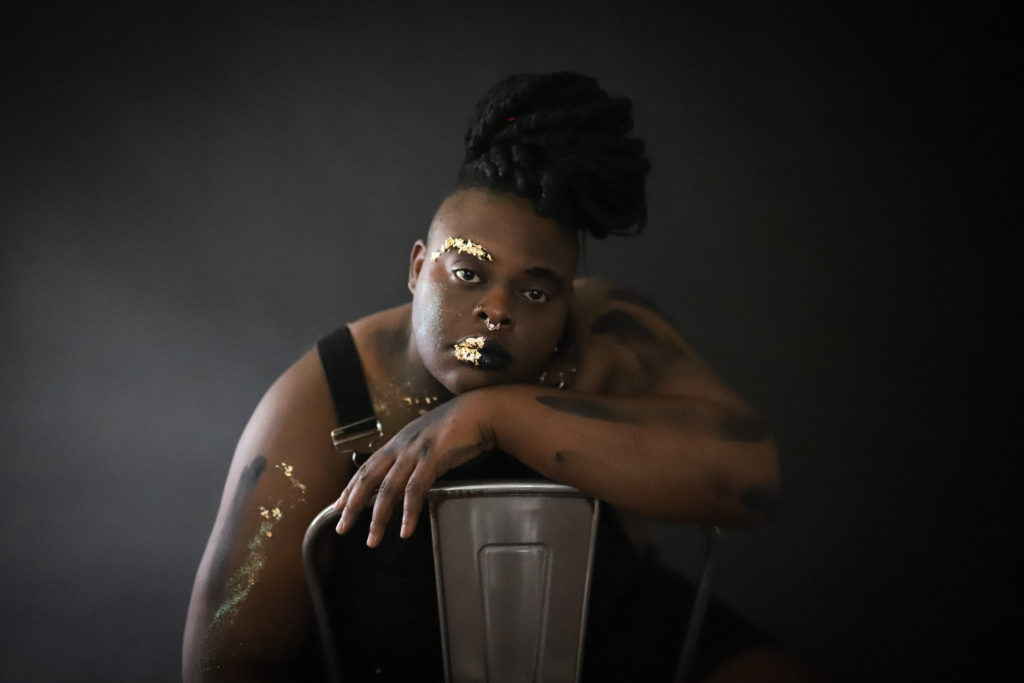
Please join us for an evening of poetry and conversation with Porsha Olayiwola, poet laureate for the city of Boston and author of the book, i shimmer sometimes too.
About the Author: Black, futurist, poet, dyke, hip-hop feminist, womanist: Porsha Olayiwola is a native of Chicago who now resides in Boston. She is a writer, performer, educator, and curator who uses afro-futurism and surrealism to examine historical and current issues in the Black, woman, and queer diasporas. She is an Individual World Poetry Slam Champion and the artistic director at MassLEAP, a literary youth organization. Olayiwola is an MFA Candidate at Emerson College, and the current poet laureate for the city of Boston.
About the Book: These poems dip their hands into the fabric of black womanhood, and revel in it. Shimmer establishes Olayiwola firmly in the lineage of black queer poetics, celebrating the work done by generations of poets from Audre Lorde to Danez Smith. This is a book of gentle breaking and inventive reconstruction. A book of self and community-care – the pursuit of building a world that will not only keep you alive, but keep you joyful.
“In language that is both pungent and poignant, Porsha Olayiwola plumbs a diaspora of resilience, rich in ringshouts and inner-city blues chanted to the sky. i shimmer sometimes, too is luminous indeed.” – Jabari Asim, author of We Can’t Breathe.
Acts of Rebellion & Envisioning a New Society: a Conversation with Drs. Vincent Brown and Timothy McCarthy
Wednesday, September 23, 2020 at 12:00 p.m.
This virtual program is co-sponsored by the Charles Warren Center for Studies in American History at Harvard University and the Carr Center for Human Rights Policy at the Harvard Kennedy School.
Please join us for a dynamic and exciting virtual conversation between Drs. Vincent Brown and Timothy McCarthy about the role of protests and revolts in shaping Black resistance and freedom movements from slave rebellions in the 18th-century Atlantic world, to the Black Lives Matter Movement today. This talk is co-sponsored by the Charles Warren Center for Studies in American History at Harvard.
About the Speakers

Vincent Brown is the Charles Warren Professor of American History and Professor of African and African American Studies at Harvard University. He directs the History Design Studio and teaches courses in Atlantic history, African diaspora studies, and the history of slavery in the Americas. Dr. Brown’s latest book, Tacky’s Revolt: the Story of an Atlantic Slave War, won the Phillis Wheatley Book Award. His award-winning first book was The Reaper’s Garden: Death and Power in the World of Atlantic Slavery.
 Timothy Patrick McCarthy, an award-winning historian, educator, and human rights activist, has taught on Harvard’s faculty since 2005. Dr. McCarthy currently holds a joint appointment in the Graduate School of Education and the John F. Kennedy School of Government, where he is Core Faculty at the Carr Center for Human Rights Policy. Dr. McCarthy is the author or editor of five books from the New Press, including Prophets of Protest: Reconsidering the History of American Abolitionism and the forthcoming Stonewall’s Children: Living Queer History in an Age of Liberation, Loss, and Love.
Timothy Patrick McCarthy, an award-winning historian, educator, and human rights activist, has taught on Harvard’s faculty since 2005. Dr. McCarthy currently holds a joint appointment in the Graduate School of Education and the John F. Kennedy School of Government, where he is Core Faculty at the Carr Center for Human Rights Policy. Dr. McCarthy is the author or editor of five books from the New Press, including Prophets of Protest: Reconsidering the History of American Abolitionism and the forthcoming Stonewall’s Children: Living Queer History in an Age of Liberation, Loss, and Love.
A Virtual Concert with Musician Balla Kouyaté
Friday, July 10, 2020 at 5:30 p.m.
Please join us for an evening of music and conversation on Friday, July 10th with master musician Balla Kouyaté. Balla will host a concert – streamed live from the Royall House & Slave Quarters – in which you will be immersed in the sounds of the balafon, which serves as a vehicle to preserve his family’s history from Mali and to showcase West African folk music. Played with mallets, this centuries-old traditional instrument – considered the antecedent of the xylophone – is made of wooden slats and rows of calabash gourds, which serve as natural amplifiers.
Joining Balla in concert is Amadou Kouyaté, who will play the kora – a string instrument that most resembles the harp.
Both artists will team up to play an exciting and innovative concert that derives from the musical traditions of the past and contemporary sounds. We hope this musical collaboration with the Royall House & Slave Quarters provides not only entertainment, but also serves as a chance to explore the different approaches to memorializing the history of enslavement and Black cultural production on both a local and global scale.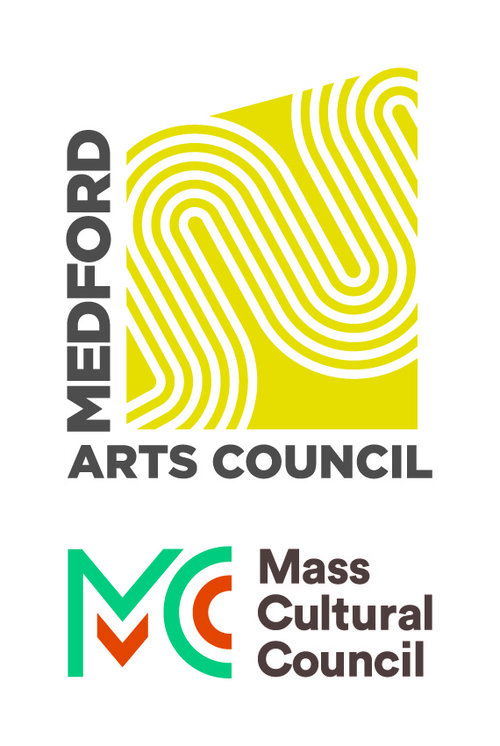
This program is supported in part by a grant from the Medford Arts Council, a local commission that is supported by the Mass Cultural Council and the City of Medford.
About the Artists: Balla Kouyaté was born in Mali and was raised in the Djeli tradition. His knowledge of the traditional Malain repertoire is unparalleled. Today, the first balafon, over 1000 years old, remains in his family, guarded by his father, El Hadji Sekou Kouyaté. It is considered a UNESCO Artifact of Oral and Intangible History. A current Medford resident and faculty member at the New England Conservatory of Music, this fall Mr. Kouyaté was awarded a prestigious NEA National Heritage Fellowship, which recognizes recipients’ artistic excellence and contribution to our nation’s traditional arts heritage. 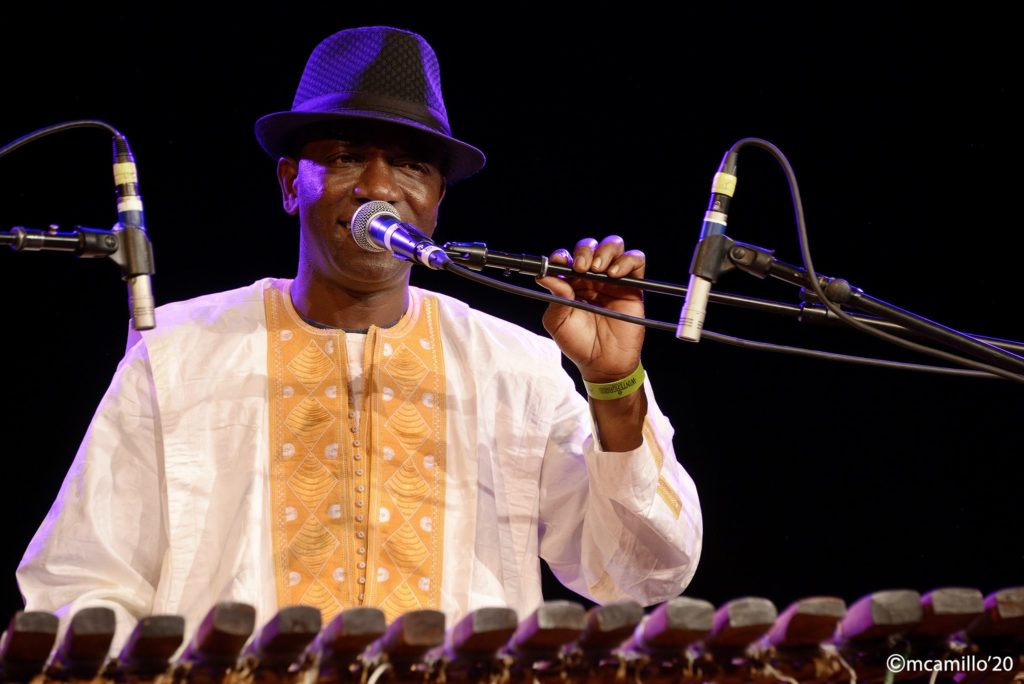
Balla’s superior musicianship has been featured on over 45 recorded, even Grammy award winning albums, including Silkroad’s Sing Me Home, Yo-Yo Ma’s, Songs of Joy and Peace, Angelique Kidjo’s Oyo, and Vusi Mahlasela’s Say Africa. Balla is currently working on a second album of his original music featuring members of his family. His music has been recorded for the Library of Congress and heard in venues such as Lincoln Center, Carnegie Hall, and The Kennedy Center as well as numerous festivals around the world. As an educator he has given lectures/demonstrations and master classes in universities and schools across the country, including Harvard University, MIT, Berklee School of Music and CalArts. Balla is currently teaching faculty for SilkRoad’s Global Musician’s Workshop and New England Conservatory. He is the recipient of the 2010 Massachusetts Artist Fellowship and the 2015 Brother Thomas Fellowship.
Amadou Kouyaté is the 150th generation of the Kouyaté family of Manding Diali (oral historians/musicians of West Africa) and the first generation born of his father’s lineage in America. Amadou performs a musical montage on the 21-string Kora and rhythmic presentations on Djembe and Koutiro drums. His repertoire ranges from traditional songs from the 13th century to original contemporary compositions incorporating blues and jazz riffs. In addition to his solo work, Amadou Kouyaté performs with guest artists as well as with The Kouyaté Family, Urban Afrikan, Farafina Kan, Manding Jata and Spank Rock.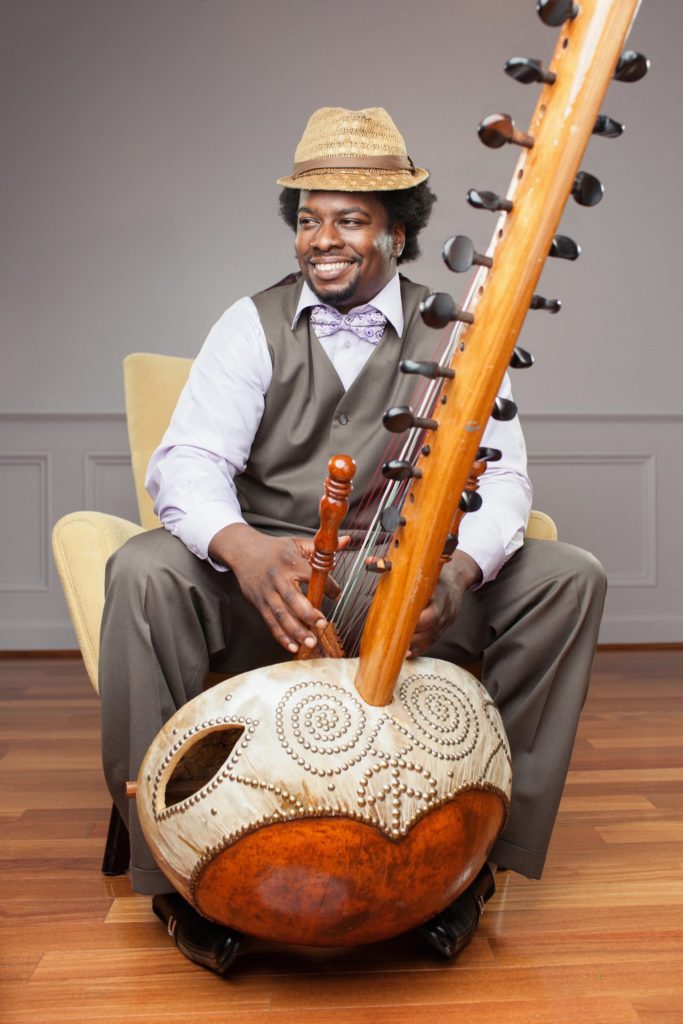
His credits include performances at The Kennedy Center, Smithsonian Institution, Bristol Academy and Isle of White (England), Tim Festival (Brazil), Lowell, East-Lansing and Dayton National Folk Festivals, Dance Africa DC, New York and Chicago, with The National Symphony Orchestra, the production “Soul Possessed,” directed by Debbie Allen, at Carnegie Hall with Sweet Honey in The Rock.
Amadou received the Maryland State Arts Council Governor’s Citation amongst many other awards.
This event was livestreamed via Facebook Live.
Special Juneteenth Program
Poetry as Protest: Dr. Malcolm Tariq
Friday, June 19, 2020 from 7:00 – 8:30 p.m.
Please join us for a night of poetry and conversation on Juneteenth with Dr. Malcolm Tariq as we debut our new “Poetry as Protest” series with this inaugural reading. Malcolm will read from his stunning debut, Heed the Hollow. 
We are honored to host this event in collaboration with our partners in the Shaw 54th Memorial Restoration Committee: the Museum of African American History, National Park Service, Friends of the Public Garden, and the City of Boston.
About the Author: Malcolm Tariq is a poet and playwright from Savannah, Georgia. He is the author of Heed the Hollow, winner of the 2018 Cave Canem Poetry Prize, and is a 2020-2021 playwright resident with the Liberation Theatre Company. A graduate of Emory University, he has a PhD in English from the University of Michigan. Malcolm lives in Brooklyn, where is the Programs and Communications Manager for the Cave Canem Foundation, a home for Black poetry.
About the Interlocutor: Camara Brown is a published poet and a PhD candidate in American Studies at Harvard University, where she writes about poetry, care, gender, sexuality, Black feminisms, and Transnational women of color feminisms. Her interdisciplinary study draws methods and reading practices from both history and literary studies to ask directly: what can historians learn about doing history from poetry?
This program was also recorded and posted on our new YouTube channel.
Coffee and Conversation: Meet the Executive Director
Thursday, May 14, 2020, 1:00 – 2:00 p.m.
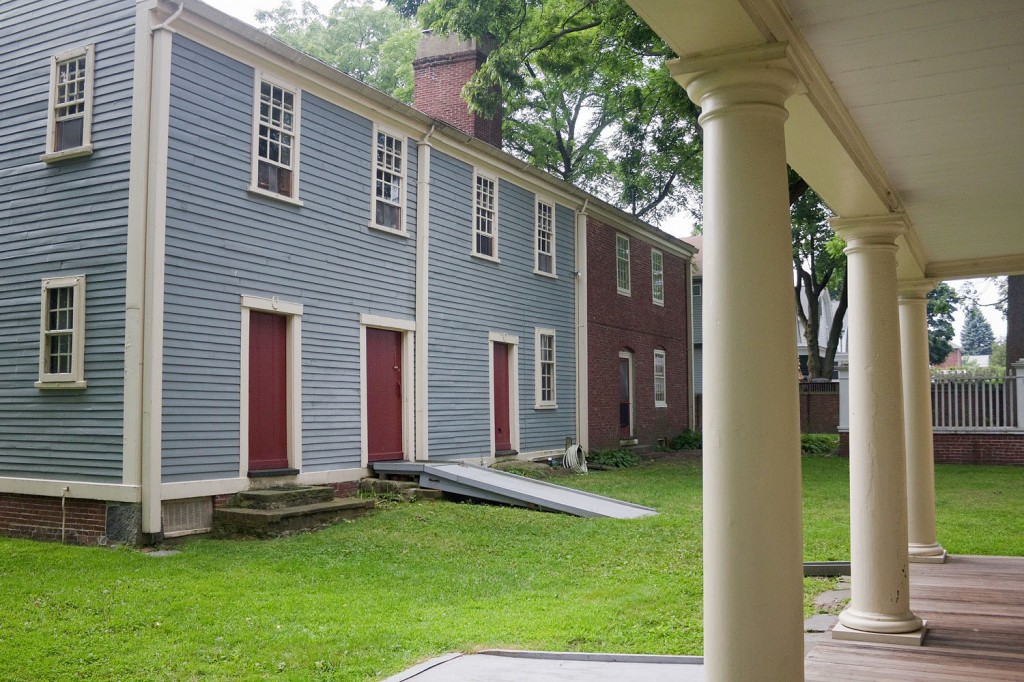
Join us for our first live, online program – a conversation with Kyera Singleton, the new Executive Director of the Royall House & Slave Quarters. Board member Barbara Berenson will interview Kyera about her journey to the RH&SQ and her plans for the museum.
To join in, please visit this GoToWebinar registration link. This program will also be recorded, posted on our new YouTube channel, and linked in next month’s e-newsletter.
Searching for Black Confederates: The Civil War’s Most Persistent Myth
Monday, November 4, 2019 at 7:30 p.m.
Independent historian Kevin Levin, who spoke here last fall about Confederate monuments and the memory of slavery, will discuss his latest book.
More than 150 years after the end of the Civil War, scores of websites, articles, and organizations repeat claims that free and enslaved African Americans fought willingly as soldiers in the Confederate army. But, as Kevin Levin argues in this carefully researched book, such claims would have shocked anyone who served in the army during the war itself. 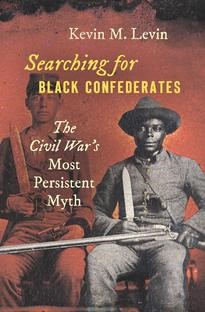
Mr. Levin explains that imprecise contemporary accounts, poorly understood primary source material, and other misrepresentations helped fuel the rise of the black Confederate myth – and, he shows that belief in the existence of black Confederate soldiers largely originated in the 1970’s, a period that witnessed both a significant shift in how Americans remembered the Civil War and a rising backlash against African Americans’ gains in civil rights and other realms.
This new book investigates the roles that African Americans did perform for the Confederate army, serving as personal body servants and forced laborers. Levin demonstrates that regardless of the dangers these men faced in camp, on the march, and on the battlefield, their legal status remained unchanged.
Copies of Searching for Black Confederates will be available for purchase and signing at the event.
Black Radical: the Life and Times of William Monroe Trotter
Wednesday, November 20, 2019 at 7:30 p.m.
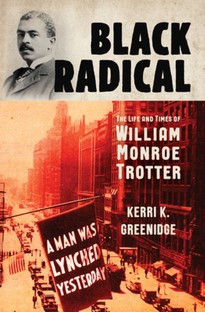 This long-overdue biography reestablishes William Monroe Trotter’s essential place next to Douglass, Du Bois, and King in the pantheon of American civil rights heroes.
This long-overdue biography reestablishes William Monroe Trotter’s essential place next to Douglass, Du Bois, and King in the pantheon of American civil rights heroes.
William Monroe Trotter (1872-1934), though still virtually unknown to the wider public, was an unlikely American hero. With the stylistic verve of a newspaperman and the unwavering fearlessness of an emancipator, he galvanized black working-class citizens to wield their political power despite the violent racism of post-Reconstruction America.
For more than thirty years, the Harvard-educated Trotter edited and published the Guardian, a weekly Boston newspaper that was read across the nation. Defining himself against the gradualist politics of Booker T. Washington and the elitism of W. E. B. Du Bois, Trotter advocated for a radical vision of black liberation that prefigured leaders such as Marcus Garvey, Malcolm X, and Martin Luther King, Jr.
Synthesizing years of archival research, historian Kerri Greenidge renders the drama of turn-of-the-century America and reclaims Trotter as a seminal figure, whose prophetic, yet ultimately tragic, life offers a link between the vision of Frederick Douglass and black radicalism in the modern era.
Dr. Kerri Greenidge is Director of the American Studies Program at Tufts University and co-Director of the African American Trail Project at the Tufts Center for the Study of Race and Democracy.
Copies of Black Radical will be available for purchase and signing at the event.
Unsilenced from the Inside: Recovering Histories of Slavery from a Florida Prison
Wednesday, July 10, 2019 at 7:30 p.m.
Since 2018, several men incarcerated at Tomoka Correctional Institution in Daytona Beach have collected, transcribed, and analyzed archival documents regarding the history of enslavement on a former plantation located thirty miles from the prison.
 These incarcerated researchers have built an archive that testifies to the lives of enslaved men and women on the nearby Spring Garden Plantation, now a Florida state park, despite park exhibits referencing unnamed individuals who are “long forgotten”.
These incarcerated researchers have built an archive that testifies to the lives of enslaved men and women on the nearby Spring Garden Plantation, now a Florida state park, despite park exhibits referencing unnamed individuals who are “long forgotten”.
Dr. Andrew Eisen, co-director of the Community Education Project at Stetson University in DeLand, Florida, will give an illustrated talk on the impressive work of his incarcerated students.
Free admission for museum members; $10 for non-members.
Abolitionism in Medford
Our home community of Medford, Massachusetts is better known for its 19th-century history of abolitionism than its earlier history of enslavement. This spring, several other local programs and exhibits will explore abolitionist history.
At the Medford Historical Society & Museum, an exhibit entitled Lydia Maria Child: Author and Abolitionist continues through March, expanding the story of this local author beyond her famed “Over the River” poem and exploring how the Medford-born daughter of a baker became one of the most important writers and abolitionists of the 19th century.
On the evening of Wednesday, April 3rd, historian Charles E. Heller will discuss his work In Advance of Fate: Portrait of an Abolitionist at the Medford Public Library. His work is a biography of wealthy industrialist and abolitionist George Luther Stearns, whose property is now part of Tufts University’s Medford campus – located just blocks from our museum. Stearns helped finance the settlement of Kansas by antislavery homesteaders, was a member of the “Secret Six” who supported fiery abolitionist John Brown, recruited thousands of black troops for the Union Army, and included his home as a stop on the Underground Railroad. This talk is co-sponsored by the Medford Historical Society & Museum.
This marble bust (left) was unveiled at a celebration hosted by George Luther Stearns at his Medford estate on January 1, 1863 – the first day the Emancipation Proclamation went into effect – where Ralph Waldo Emerson recited his Boston Hymn and Julia Ward Howe her Battle Hymn of the Republic. It is displayed in the Tisch Library at Tufts, accompanied by a bust of Stearns that was commissioned from inventor/artist Samuel Morse by widow Mary Stearns, whose will stipulated that both pieces go to the University upon the death of her sons.
On Sunday, April 7th, an exhibit on Stearns, Shaw, and the Hallowells will open at the Medford Historical Society & Museum. Featuring items from the museum’s Civil War collection, this exhibit will explore the connections between George Luther Stearns, Robert Gould Shaw, and the Medford Hallowell brothers, Edward and Norwood. Stearns recommended Shaw to lead the famed 54th Regiment Massachusetts Volunteer Infantry in the Civil War. When Shaw was killed at Fort Wagner, Medford’s Edward Hallowell took his place. Edward’s brother Norwood led the 55th Massachusetts regiment.
2018 In Review: Happy New Year!
As we look forward to another busy year, we’re pleased to share some highlights of our museum’s activity in 2018.
Our 2018 tour season was our museum’s busiest yet:
- We welcomed a 13% increase in tour visitors over the previous year.
- We hired a diverse team of professional guides to lead regularly scheduled tours for the first time, and were delighted with positive visitor feedback on the quality of the new tour experience.
- More than 40 college classes, alumni groups, clubs and service organizations, adult education programs, and other groups arranged for special tours last year.
- School field trip numbers increased with the addition of several new communities and independent schools last year.
Thank you to our speakers, and to hundreds of guests who joined us for an engaging array of book talks and other programs last year:
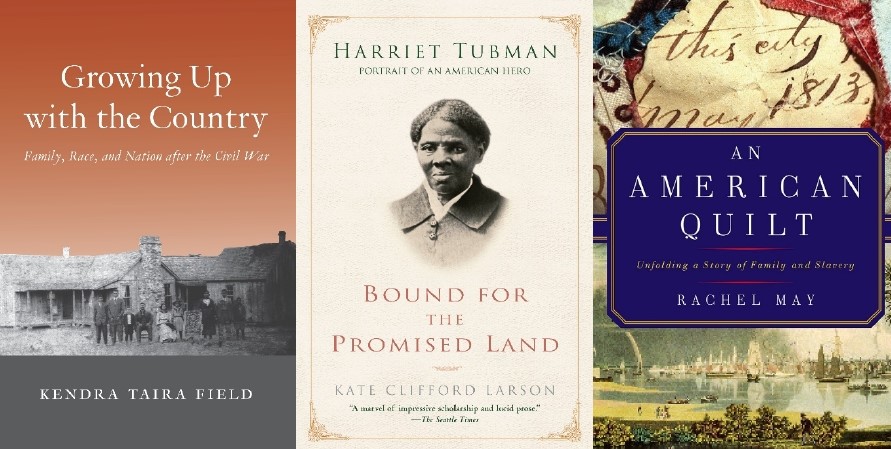
- In January, Tufts University historian Kendra Field spoke about her family’s fascinating history as told in Growing Up with the Country: Family, Race, and Nation after the Civil War.
- Art historian Charmaine Nelson used contemporary artwork and descriptions of freedom-seekers from advertisements to explore enslavement in her native Canada for an April program.
- In May, we welcomed author and quilter Rachel May for a discussion of An American Quilt: Unfolding a Story of Family and Slavery, her illuminating examination of early 19th century slavery through the story of an unfinished quilt.
- March storms postponed historian/biographer Kate Clifford Larson’s book talk about Bound for the Promised Land: Harriet Tubman, Portrait of an American Hero until October – but her lively and informative talk was worth waiting for!
- In early November, interdisciplinary artist Ifé Franklin offered an evocative reading from The Slave Narrative of Willie Mae, her powerful new book written in the voice of her great-grandmother. She then led a hands-on Slave Cabin Workshop in which participants worked with fabric, shells, beads, and buttons to creatively interpret miniature dwelling spaces as a way of honoring their ancestors.
- In late November, historian Jonathan Michael Square, founder of the digital humanities project Fashioning the Self in Slavery and Freedom, centered an engrossing talk on Brooks Brothers’ livery business, which provided garments for coachmen and footmen in the antebellum South.
We are deeply grateful to historian Hasan Kwame Jeffries for making September’s Giving Voice event such a great fundraising and “friend raising” success. Professor Jeffries co-led a workshop on teaching the hard history of American slavery for local classroom teachers, then gave an inspiring talk to 100+ deeply engaged audience members. Sincere thanks to all involved.
We undertook several projects to preserve and enhance or building and grounds in 2018: 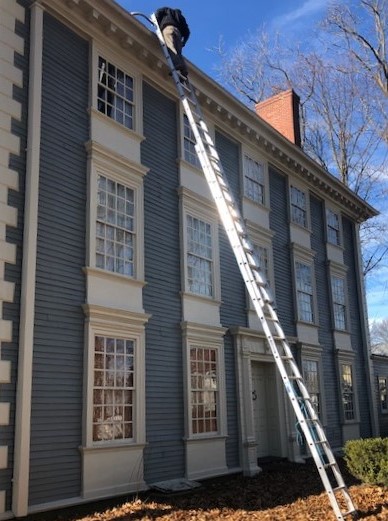
- A portion of our current 4-year Cummings Foundation grant funded a thorough assessment of our two buildings’ short- and long-term restoration needs.
- The most pressing project was to restore rotting sections of gutter on the mansion and line them with lead to forestall future damage. This project was completed in December, and our contractors will return in the early spring to tackle the failing gutters on the Slave Quarters.
- We used Cummings Foundation funds to replace a sinking 1920’s- era “ribbon” driveway with a brick and stone pad that greatly improves the view of our site from the street.
- We worked with the City of Medford’s Department of Public Works to repair the deteriorating wooden section of the wall between our site and the adjacent city-owned Royall Park.
Finally, in 2018 we were delighted to welcome two new board members – Ariana Fiorello, the latest occupant of our Belinda Sutton Emerging Professional board seat, and Cutty Thomas, our new Assistant Treasurer – along with many new volunteers.
Force and Freedom: Black Abolitionists and the Politics of Violence
Wednesday, March 20, 2019 at 7:30 p.m.

From its origins in the 1750’s, the white-led American abolitionist movement adhered to principles of “moral suasion” and nonviolent resistance. But a century later, any rights black Americans held as enslaved or free people had been voided. As conditions deteriorated for African Americans, black abolitionist leaders embraced violence as the only means of shocking Northerners out of their apathy and instigating an antislavery war.
In her forthcoming book, Wellesley College historian Kellie Carter Jackson provides the first historical analysis exclusively focused on the tactical use of violence among antebellum black activists. Force and Freedom takes readers beyond the honorable politics of moral suasion and the romanticism of the Underground Railroad and into an exploration of the agonizing decisions, strategies, and actions of the black abolitionists who, though lacking an official political voice, were nevertheless responsible for instigating monumental social and political change.
Kellie Carter Jackson is a historian and an Assistant Professor at Wellesley College in the Department of Africana Studies. She earned her B.A. from Howard University, and her PhD from Columbia University.
Copies of Force and Freedom will be available for purchase and signing at the event.
Passage at St. Augustine: Film and Discussion
Wednesday, January 16, 2019 at 7:00 p.m.

The award-winning Passage at St. Augustine documents an event in a southern town that divided the community along racial lines, generating national and international news, and ultimately effecting change.
The hour-long film by Clennon L. King is about the bloodiest campaign of the Civil Rights movement that unwittingly leveraged the passage of the landmark Civil Rights Act of 1964, outlawing Jim Crow segregation from coast to coast.
After the screening, the filmmaker will engage the audience in a discussion of the history, impact, and legacy of race in the narrative just seen — and in the here and now. Clennon L. King is an Emmy-nominated journalist, historian, and documentary filmmaker with 30+ years of experience in visual storytelling. He speaks nationally on the history, legacy, and impact of race in America.
A Stain on an All-American Brand: How Brooks Brothers Once Clothed Slaves
Wednesday, November 28, 2018 at 7:30 p.m.
Like many 19th-century northern commercial institutions, Brooks Brothers — celebrating its bicentennial this year — benefited from the institution of slavery. The storied clothier’s livery department provided garments for coachmen, footmen, and chauffeurs in wealthy American households, including those in the antebellum South.
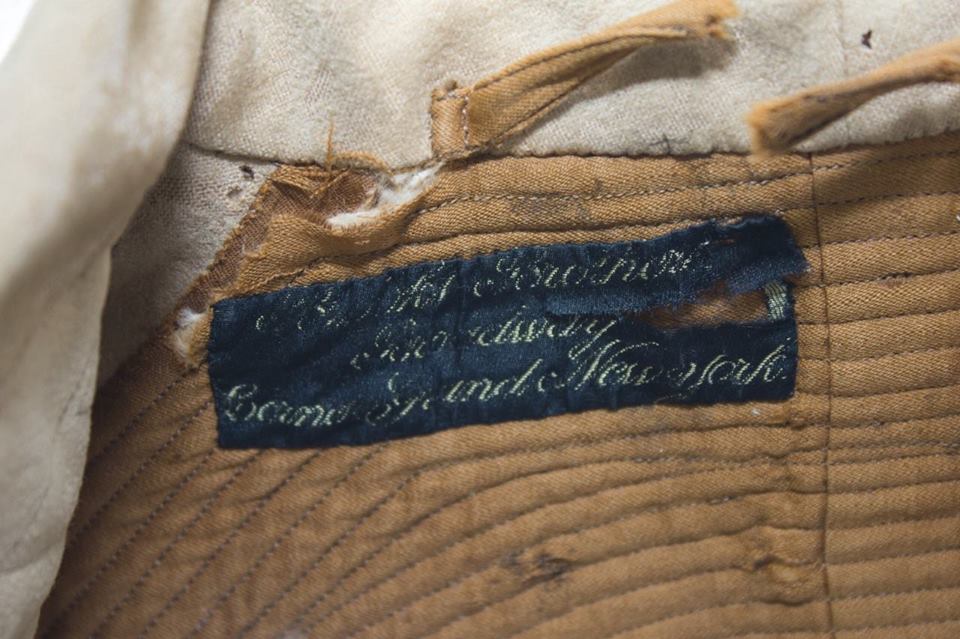
This illustrated talk by Jonathan Michael Square, a writer and historian specializing in the fashion and visual culture of the African Diaspora, explored this intriguing connection.
Dr. Square is currently a lecturer on history and literature at Harvard University. He holds a PhD in history from New York University, a Master’s degree from the University of Texas at Austin, and a B.A. from Cornell University. He founded and edits the digital humanities project Fashioning the Self in Slavery and Freedom — a curated platform that explores intersections between slavery and the fashion system on various social media platforms.
Artist Ifé Franklin joined us for two special programs this fall:
Readings from The Slave Narrative of Willie Mae
Saturday, November 3, 2018 at 1:00 p.m.
A graduate of the School of the Museum of Fine Arts, Boston, Ifé Franklin has worked as a professional artist for more than 25 years. She specializes in indigo-dyed textiles, using resist and dyeing techniques from West African culture. Ms. Franklin has taught textile and other art forms at the Eliot School for Applied Arts and the Massachusetts College of Art and Design. She has exhibited her work in solo and group shows at several Boston-area galleries and her indigo-dyed fabric-wrapped “Slave Cabin” is part of the Fitchburg Art Museum’s permanent collection.
Hands-on Slave Cabin Project Workshop
Saturday, November 3, 2018 from 2:30-4:30 p.m. – Reservations Required
Beginning at 2:30 p.m., artist Ifé Franklin will also lead a 2-hour hands-on Slave Cabin workshop for 20 participants. She will guide participants in using materials such as fabric, shells, raffia, and beads to creatively interpret miniature cabin-like structures of their own design to take home with them.
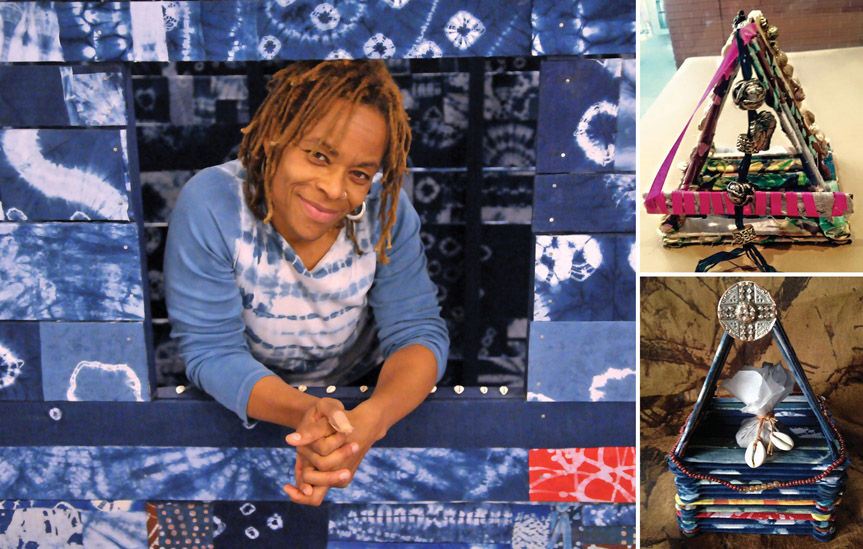
Using the artist’s Indigo Project for inspiration, these small creations are reminiscent of slave cabins, designed to honor the ancestral spirits of Africans enslaved throughout colonial America. Ms. Franklin describes them as “wishes or gifts to the spirits of these ancestors, who never had a home of beauty, or even a home of their own.” She has led similar workshops as the featured guest artist at Boston’s Isabella Stewart Gardner museum.
Children ages 7-12 are welcome, but must be accompanied by an adult. The workshop will include a brief museum tour and light refreshments.
This workshop is co-sponsored by Historic New England and supported in part by a grant from the Medford Arts Council, a local agency supported by the Massachusetts Cultural Council, a state agency.
Harriet Tubman: Bound for the Promised Land, with Historian Kate Clifford Larson
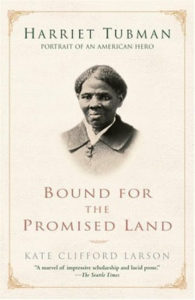
Wednesday, October 17, 2018 at 7:30 p.m.
Known widely as a simple and courageous mother figure, in fact Harriet Tubman was an intelligent, crafty, fearless visionary who transcended assumptions about black women’s abilities, leading scores of enslaved people to freedom. Drawing from a trove of primary documents as well as extensive genealogical research, historian Kate Clifford Larson‘s Bound for the Promised Land reveals Tubman as a complex woman–brilliant, shrewd, deeply religious, and passionate in her pursuit of freedom.
Since writing the first adult biography of Tubman, Professor Larson has consulted with numerous public history initiatives related to Harriet Tubman’s life and her role in the Underground Railroad. At this expanded book talk, she’ll discuss new scholarship about Tubman–including the recently discovered portrait of her as a young woman–and recent efforts A to memorialize this brave hero in her native Maryland and in New York State.
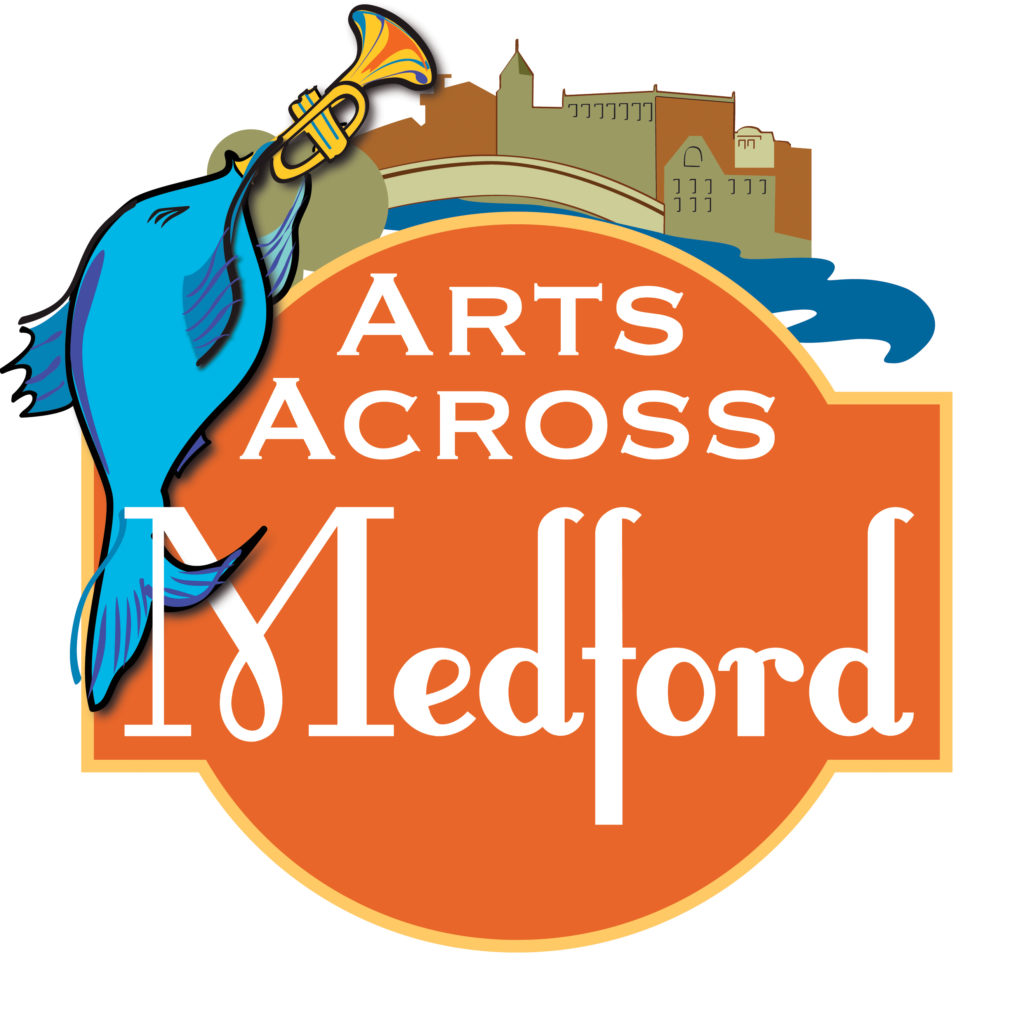
This event was part of Arts Across Medford, a month-long festival curated by CACHE.
“An American Quilt: Unfolding a Story of Family and Slavery” with author Rachel May
Wednesday, May 23, 7:30 p.m.
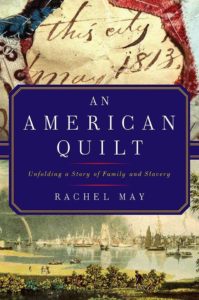
We are delighted to announce Rachel May‘s return to our site to discuss her book published on May 1st, 2018: An American Quilt: Unfolding a Story of Family and Slavery.
Following the trail left by an unfinished quilt, this illuminating saga examines slavery from the cotton fields of the South to the textile mills of New England– and the humanity behind it.
May’s new book explores the far reach of slavery, from New England to the Caribbean, the role it played in the growth of mercantile America, and the bonds between the agrarian south and the industrial north in the antebellum era–all through the discovery of a remarkable quilt. While studying objects in a textile collection, she opened a veritable treasure-trove: a carefully folded, unfinished quilt made of 1830’s-era fabrics, its backing containing fragile, aged papers that mentioned “shuger”, “rum”, and “West Indies”. The quilt top sent May on a journey to piece together the story of the women behind it– both enslaved and free.
May is the author of Quilting with a Modern Slant, a 2014 Library Journal and Amazon.com Best Book of the Year. She is an assistant professor at Northern Michigan University. Copies of An American Quilt were available for purchase and signing at the event.
“understands waiting upon a Gentleman, and looks well in Livery”: Commodification, Resistance, and Labour in Eighteenth and Nineteenth-Century Quebec Slave Advertisements
Wednesday, April 18, 2018 – 7:30 p.m.
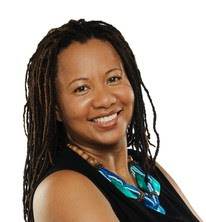
Art historian Charmaine Nelson expands the traditional slave-trade triangle to include Canada. Mining an array of sources—including maps, artwork, and the Canadian fugitive slave archive—her goal is to re-humanize people who were dehumanized. “Even in the stories of how they escaped, sometimes slave owners would inadvertently disclose how intelligent the escapees were, and how much forethought and planning went into escaping,” Nelson says.
Through an exploration of the various forms of human commodification–auctions, private, and public sales–Professor Nelson will offer evidence about the ethnic make-up of British Quebec’s enslaved population and the nature of their labors, drawing parallels and distinctions between Canada and other transatlantic sites.
Art historian Charmaine Nelson–a professor at McGill University in Montreal–is currently at Harvard as the William Lyon Mackenzie King Chair in Canadian Studies.
Growing Up with the Country: Family, Race, and Nation after the Civil War: with Historian Kendra Taira Field
Wednesday, February 7, 2018 -7:30 p.m.
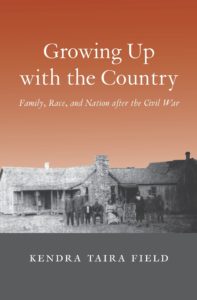
Following the lead of her own ancestors, historian Kendra Taira Field’s epic family history chronicles the westward migration of freedom’s first generation in the fifty years after emancipation. Drawing on decades of archival research and family lore within and beyond the United States, Field details lives and choices that deepen and widen the roots of the Great Migration, exploring how ideas about race and color powerfully shaped the pursuit of freedom.
When statehood, oil speculation, and Jim Crow segregation imperiled their lives and livelihoods, these formerly enslaved men and women again chose emigration. Some migrants launched a powerful back-to-Africa movement, while others moved on to Canada and Mexico. Their lives and choices deepen and widen the roots of the Great Migration. Interweaving black, white, and Indian histories, Field’s narrative explores how ideas about raceand color powerfully shaped the pursuit of freedom.
“Kendra T. Field skillfully draws family stories and community histories into a sweeping and compelling critique of the competing sovereignties, conflicting claims to freedom, and shifting racial regimes that shaped the United States.” —Craig Steven Wilder, author of Ebony & Ivory: Race, Slavery, and the Troubled History of America’s Universities
Kendra Taira Field is assistant professor of history and director of the Center for the Study of Race and Democracy at Tufts University.
Copies of Growing Up with the Country, slated for publication on January 9th, will be available for purchase and signing at the event. Free admission for RH&SQ members and Tufts University students; general admission is $10.
Dedication of Belinda Sutton’s Stopping Stone
Sunday, November 19 at 1:30 PM – 3 PM
Please join us for the dedication of the newly installed Stopping Stone in memory of Belinda Sutton, whose 1783 petition for a pension from the estate of Isaac Royall Jr. is among the first narratives by an African American woman.
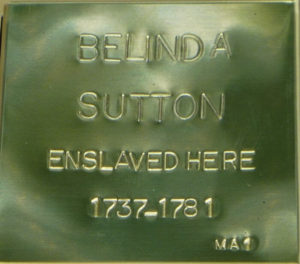
Located just outside the George Street entrance to Royall Park, adjacent to our museum, this small brass marker reads “Belinda Sutton, enslaved here 1737-1781.”
The Stopping Stones project is described as “an historical reparations endeavor designed to bring attention to the persons and places impacted by slavery, to reveal the roots of prejudice and hatred against African Americans in the United States and to catalyze actions to extinguish their impact.”
We are honored that the project chose to work with us to create and install its first memorial, and we are grateful to Ruth and Bruce Lynn of Temple Isaiah in nearby Lexington for generously sponsoring her marker.
Each Stopping Stone is engraved with an identifier that corresponds with an entry in the project’s searchable database. View Belinda Sutton’s entry and learn more about this effort here.
Following a brief ceremony at the Stopping Stone, guests are invited to the Slave Quarters for light refreshments and to view informational exhibits.
Steering to Freedom: A Book Talk by Patrick Gabridge
Wednesday, November 15, 7:30pm – 9pm
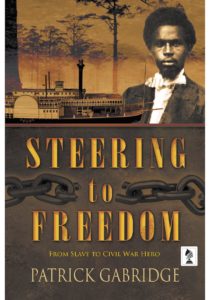
In May 1862, Robert Smalls, an enslaved ship’s pilot in Charleston, South Carolina, crafted a daring plan to steal the steamship Planter and deliver it, along with the crew and their families, to the Union blockade. After risking his life to escape slavery, Robert faced an even more difficult challenge: convincing Abraham Lincoln to enlist black troops. Based on a true story, the novel “Steering to Freedom” tells the powerful and inspirational story of a young man who became the first black captain of a US military ship, while struggling to navigate a path to freedom for himself, his family, and his people.
Copies of “Steering to Freedom” were available for purchase and signing at the event. Free admission for RH&SQ members; $10 for non-members.
About the author: Patrick Gabridge is the author of three novels: Steering to Freedom, Tornado Siren, and Moving [a life in boxes]. His full-length plays include Lab Rats, Distant Neighbors, Constant State of Panic, and Chore Monkeys. He’s been a Playwriting Fellow with the Huntington Theatre Company and New Rep. His site-specific play about the day after the Boston Massacre, Blood on the Snow, was performed at Boston’s Old State House the last two summers. His other historical plays include work about the creation of the English Bible (Fire on Earth), the astronomers Kepler and Tycho (Reading the Mind of God), a volcanic eruption on Martinique (The Prisoner of St. Pierre), and 19th century Boston publisher Daniel Sharp Ford (None but the Best). His short plays have received more than 1,000 productions from theaters and schools around the world.
Confederate Monuments and the Memory of Slavery: A Discussion with Historian Kevin Levin
Wednesday, October 25, 7:30pm – 9pm
The Southern Poverty Law Center estimates that there are more than 700 Confederate monuments in America’s public spaces, along with hundreds of schools, streets, and communities named for Confederate icons.

Historian, educator, and author Kevin Levin has blogged at Civil War Memory for more than a decade. He will discuss the historical origins of these monuments — their connection to “Lost Cause” remembrance of the Civil War and the Jim Crow era of the 20th century — and how the divisive current debate over their future connects to our nation’s memory of slavery.
Free admission for RH&SQ members; $10 for non-members.
Special Benefit Event: An Evening for Education
Friday, June 16, 2017 – 6:30-8:30 p.m.
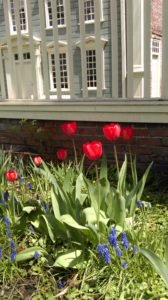
Please join us for a special evening to benefit our school programs. Enjoy wine and refreshments, learn more about this remarkable site, and help local children explore the history of slavery and the meanings of freedom in America.
* Celebrate the opening of our Enslavement to Freedom exhibit
* Experience activities from our school programs and hear from education staff
* See the mansion’s clock-wound spit jack in action
* Take a twilight tour of our museum’s historic grounds
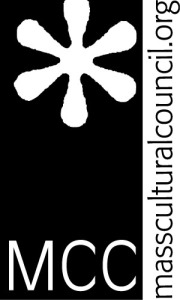
All proceeds benefit our museum’s school programs. The new exhibit is funded in part by the Massachusetts Cultural Council, the Society of Colonial Wars in the Commonwealth of Massachusetts, and the General Society of Colonial Wars.
Colonial Comics, Volumes I & II
Wednesday, March 22, 2017 at 7:30 p.m.
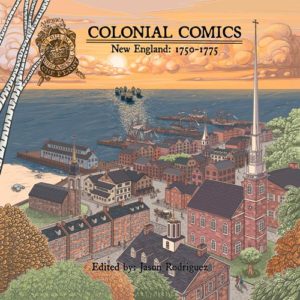
J. L. Bell, a co-editor of and contributor to Colonial Comics, will lead a panel of participating authors and illustrators discussing the stories and artwork that make up this innovative graphic anthology series on New England’s history. Volume I told lesser known stories of the years 1620-1750, and the new Volume II features the period 1750-1775.
Featuring an array of writing and illustration styles, the series tells stories about Puritans and free thinkers, Pequots and Jewish settlers, female business owners and playwrights, gravedigging medical students, instigators of civil disobedience, college students, rum traders, freemen, and enslaved people.
J. L. Bell is a Massachusetts historian and writer whose Boston 1775 blog offers history, analysis, and unabashed gossip about the start of the American Revolution in Massachusetts. He is the author of a comprehensive historic research study for the National Park Service on the Longfellow House – Washington’s Headquarters National Historic Site, and his book The Road to Concord: How Four Stolen Cannon Ignited the Revolutionary War came out last spring. Jesse Lonergan illustrated the Colonial Comics story about Crispus Attucks, and is the author-illustrator of the graphic novels All Star, Flower and Fade, and Joe and Azat. E.J. Barnes wrote and illustrated a story in Volume I about a conflict among two groups of Puritan settlers and the Native groups they settled among. She’s a Cambridge artist working on other history comics, as well.
Copies of both volumes of Colonial Comics were available for purchase and signing.
Free admission for RH&SQ members; $5 for all others.
A Revolution in Color: The World of John Singleton Copley: A Book Talk by Jane Kamensky
Wednesday, January 18, 2017 at 7:30 PM – 9 PM
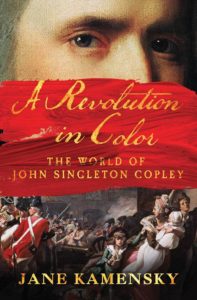
Harvard historian Jane Kamensky recovers an unknown American Revolution as seen through the eyes of Boston-born painter John Singleton Copley.
Author Geraldine Brooks says, “A pleasure to read from first page to last, Jane Kamensky’s exploration of the life, work and tumultuous times of John Singleton Copley is itself a masterpiece. Like all excellent portraitists, Kamensky probes deeply into the character of her subject, as deft with the small, revealing detail as she is with the sweeping strokes of landscape and setting. Both gripping narrative history and insightful art criticism, A Revolution in Color is a genre-busting tour de force.”
Admission free for RH&SQ members; $5 for non-members.
Copies of A Revolution in Color were available for purchase and signing at the program.
The Slave’s Cause: A History of Abolition: A Book Talk with Historian Manisha Sinha
Wednesday, November 16 at 7:30 PM – 9 PM
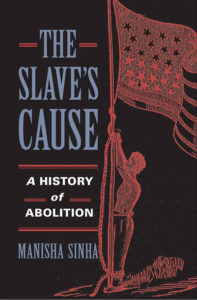
Historian Manisha Sinha, Draper Chair in American History at the University of Connecticut at Storrs, talked about her recently published book The Slave’s Cause: A History of Abolition.
“This well-written and accessible book has many strengths, but Sinha’s able deployment of so many sources makes it outstanding. Looking past the image of a kneeling slave that British readers are still used to seeing in works on this subject, Sinha brilliantly shows how African Americans themselves worked tirelessly to make freedom a reality.” — Times Higher Education.
Copies of The Slave’s Cause were available for purchase and signing at the event.
The Slave Cabin Project with Ifé Franklin
Saturday, November 5 at 2 PM – 4 PM
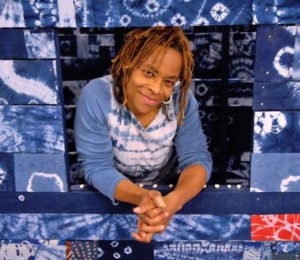
Teaching artist Ifé Franklin will guide workshop participants in creating small cabin-like structures of their own design to take home with them. Participants will work with fabric, shells, raffia, beads, and buttons to creatively interpret these miniature dwelling spaces.
Using the artist’s Indigo Project for inspiration, these small creations are reminiscent of slave cabins, designed to honor the ancestral spirits of Africans who were enslaved throughout colonial America. Ms. Franklin describes them as “wishes or gifts to the spirits of these ancestors, who never had a home of beauty, or even a home of their own.” She has led similar workshops as the featured guest artist at Boston’s Isabella Stewart Gardner Museum.
A graduate of the School of the Museum of Fine Arts, Boston, Ifé Franklin has worked as a professional artist for more than 25 years. She specializes in indigo-dyed textiles, using resist and dyeing techniques from West African culture. Ms. Franklin has taught textile and other art forms at the Eliot School for Applied Arts and the Massachusetts College of Art and Design. She has exhibited her work in solo and group shows at several Boston-area galleries and her indigo-dyed fabric-wrapped “Slave Cabin” is part of the Fitchburg Art Museum’s permanent collection.
Ms. Franklin will lead a 2-hour workshop for up to 20 participants. The program will take place in the only remaining slave quarters building in the North, which features an exhibit of 18th-century artifacts unearthed on site.
Fee is $10 for RH&SQ or Historic New England members and $15 for all others. Preregistration is required.
To register, please email Programs@RoyallHouse.org, indicating the names of attendees and whether you are a member of either sponsoring organization. Please note that space is limited.
This program is co-sponsored by Historic New England and is supported in part by a grant from the Medford Arts Council, a local agency which is supported by the Massachusetts Cultural Council, a state agency.
Brethren by Nature: Indians, Colonists, and the Origins of American Slavery: a Book Talk by Historian Margaret Ellen Newell
Wednesday, October 26 at 7:30 PM – 9 PM
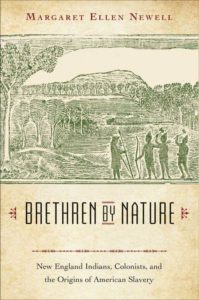
In Brethren by Nature, Margaret Ellen Newell reveals a little-known aspect of American history: English colonists in New England enslaved thousands of Indians. Massachusetts became the first English colony to legalize slavery in 1641, and the colonists’ desire for unpaid labor shaped the major New England Indian wars, including the Pequot War of 1637, King Philip’s War of 1675–76, and the northeastern Wabanaki conflicts of 1676–1749. When the wartime conquest of Indians ceased, New Englanders turned to the courts to get control of their labor, or imported Indians from Florida and the Carolinas, or simply claimed free Indians to be enslaved.
Drawing on letters, diaries, newspapers, and court records, Newell recovers enslaved people’s own stories and shows how they influenced New England society in crucial ways. Indians lived in English homes, raised English children, and manned colonial armies, farms, and fleets, exposing their captors to Native religion, foods, and technology. Some achieved freedom and power in this new colonial culture, but others experienced violence, surveillance, and family separations.
Margaret Ellen Newell is professor and vice chair of faculty in the Department of History at The Ohio State University. Her research and teaching interests include colonial and revolutionary America, Native American history, economic history, material culture, and comparative colonial American/Latin American history. Her book, Brethren by Nature: New England Indians, Colonists, and the Origins of American Slavery (Cornell University Press, 2015), the subject of our talk, earned Newell the James A. Rawley Prize for best book on race relations in the United States from the Organization of American Historians. She is also the author of From Dependency to Independence: Economic Revolution in Colonial New England (Cornell University Press, 1998; new edition 2015), as well as numerous articles and chapters.
Co-sponsored by the Medford Historical Society & Museum and the Friends of the Medford Public Library.
Copies of Brethren by Nature were available for purchase and signing at the event.
Seminar: New Perspectives on Slavery in New England
Thursday, September 15 at 1 PM – 5 PM
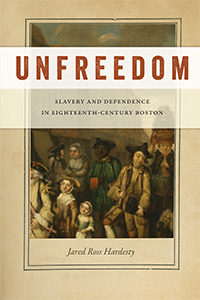
Historian Jared Hardesty talked about his book, Unfreedom: Slavery and Dependence in Eighteenth Century Boston, on Wednesday, September 14 at 6:30 PM at the Old North Church & Historic Site in Boston’s North End.
Professor Hardesty is a historian of colonial America and the Atlantic World. His research investigates the contours of slavery, labor, and the nature of power in British North America. He completed a B.A. in History at Ohio Northern University and a MA and Ph.D. in History from Boston College and is currently an Assistant Professor of History at Western Washington University. His book, “Unfreedom: Slavery and Dependence in Eighteenth-Century Boston” (Early American Places Series, New York University Press), examines the lived experience of enslavement in eighteenth-century Boston.
Both programs were brought to you by the Old North Foundation in partnership with the Royall House and Slave Quarters.
Reading Frederick Douglass: A Public Reading on Boston Common
Thursday, June 30, 2016, at 12 PM – 2 PM
At noon on June 30th we’ll join 20+ other organizations in co-sponsoring the annual communal reading of “What to the Slave Is the Fourth of July?” on the Boston Common.
In his fiery July 5, 1852, speech, Frederick Douglass took exception to being asked to commemorate the signing of the Declaration of Independence, reminding his audience that “the rich inheritance of justice, liberty, prosperity and independence, bequeathed by your fathers, is shared by you, not by me.”
We are truly honored to have been invited to join the Charles Hamilton Houston Institute for Race and Justice at Harvard Law School, Community Change Inc, Mass Humanities, and a host of other civic and community organizations in co-sponsoring this event, which will take place at The Robert Gould Shaw and Massachusetts 54th Regiment Memorial, located across Beacon Street from the State House.
Annual Community Open House
Saturday, May 21, 2016 – 1:00-3:00 p.m.
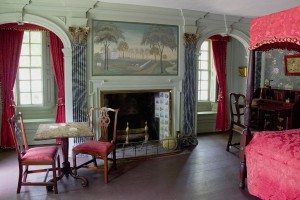
This year we will launch our tour season with a Community Open House on Saturday, May 21st, from 1-3 p.m. Guides stationed in the mansion, in the Slave Quarters, and on the grounds will be available to answer visitors’ questions. There will be no regular guided tours on this day.
The museum reopens for regular tours on Sunday, May 22, and will be open each Saturday and Sunday through October 30, with guided tours at 1, 2, and 3 p.m. Tours are always free for members, with a modest admission fee for non-members. Admission to the Slave Quarters, which houses exhibits and the museum shop, is free during tour hours.
Rediscovery to Memorial: The Effort to Create a Memorial at Portsmouth’s African Burying Ground, Illustrated talk by community member Vernis M. Jackson and project manager David Moore
Wednesday, April 20, 2016 at 7:30 PM
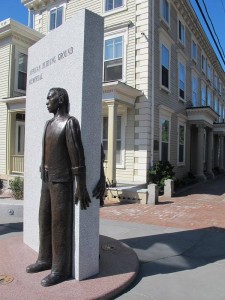
In October 2003, remains of 13 individuals were discovered during infrastructure work under Chestnut Street in downtown Portsmouth, New Hampshire. Eight sets of human remains were exhumed and determined to be of African ancestry. In early 2004, the City Council appointed the African Burying Ground Committee to determine a proper way to honor those buried at Chestnut Street. Over the next twelve years the Committee worked with the abutters, a national design team, community partners, and the general public to research, design, and fund what has become the African Burying Ground Portsmouth Memorial Park, “We Stand in Honor of Those Forgotten.” The park was dedicated in 2015.
The Portsmouth site is the only known African burying ground from the 18th century in Northern New England. As noted on the site’s website, “The intent is to mark with dignity the location of this sacred place – not with headstones like the City’s other places of burial – but by creating a public place of reverence on this block of urban downtown street, in perpetuity, so that we will never again forget those buried beneath.”
Vernis M. Jackson and David Moore will present an illustrated talk on this important piece of history and memorial. Ms. Jackson is Chair of the City of Portsmouth African Burying Ground Committee and Founder and Past President of the Seacoast African American Cultural Center. David Moore is the Assistant City Manager for the City of Portsmouth and project manager for the African Burying Ground Memorial Park.
On the Battlefield of Merit: Harvard Law School, the First Century, Illustrated Book talk by historian Daniel R. Coquillette, co-author with Bruce A. Kimball, the first of a two-volume history of Harvard Law School
Wednesday April 6, at 7:30 PM
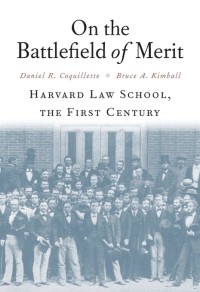
Harvard University’s recent decision to retire Harvard Law School’s shield, which was derived from the family crest of Isaac Royall, Jr., has brought new attention to the history of Harvard Law School. This renewed attention was sparked by historian Daniel Coquillette’s new history of the first century of Harvard Law School, which explores the school’s ties with institutional slavery.
During its first century, Harvard Law School pioneered revolutionary educational ideas, including professional legal education within a university, Socratic questioning and case analysis, and the admission and training of students based on academic merit. But the school struggled to navigate its way through the many political, social, economic, and legal crises of the century, and it earned both scars and plaudits as a result. Historian Daniel Coquillette will examine the school’s connection to northern and southern slavery, involvement in the Civil War, reluctance to admit minorities and women, pervasive anti-Catholicism, and the racism that, he says, “runs like a river through” this history.
Professor Coquillette is J. Donald Monan, S.J., University Professor, Boston College Law School, and Charles Warren Visiting Professor of American Legal History, Harvard Law School.
Stitches in Time: Family and Slavery in Mercantile America, an Illustrated talk by author/quilter Rachel May
Wednesday, March 16, 2016 at 7:30 PM
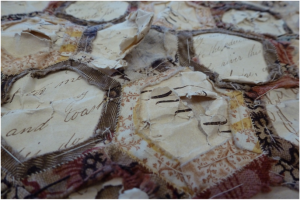
In 1917, a trunk that had remained closed for nearly a century was opened to reveal a treasure trove of family clothes, hundreds of letters, account books, a medical diary, and three quilt tops whose paper backings are dated as early as 1798 and reference rum, “shuger,” and the West Indies — critical elements, of course, of the slave trade.
The Crouch family were not slave traders, but like most 19th century merchant families, they were implicated in the trade and lived between North and South, traveling up and down the coast to visit one another and sending goods for both business and personal use — cotton, lumber, apples, jam, and cloth.
Referenced in their letters are the people who were enslaved to build their homes and businesses — Boston, Minerva, George, and Jenny, to name just a few. “Stitches in Time” tells the story of the Crouches and the people who were enslaved by them, through the lens of the quilt tops, from the 1830s to the late 1860s, in Charleston, SC and Providence, RI, chronicling local and national events.
About the speaker: Rachel May is an Assistant Professor of Creative Writing at Northern Michigan University, where she teaches nonfiction. Her first book, “Quilting with a Modern Slant,” was named a Best Book of 2014 by Library Journal and Amazon.com, and favorably reviewed in The LA Times, The Chicago Tribune, Publisher’s Weekly, MarthaStewartLiving.com, and The Providence Journal, among other venues. Two books of fiction, “The Benedictines,” a novel, and “The Experiments: A Legend in Pictures and Words,” are forthcoming, and she’s at work on a book of creative nonfiction. She holds a PhD in English Literature & Cultural Studies from The University of Rhode Island and an MFA from The University of Montana.
Voices Beyond Bondage: An Anthology of Verse by African Americans of the 19th Century, a Book Talk by co-editors Erika DeSimone and Fidel Louis
Wednesday, February 24, 2016 at 7:30 PM
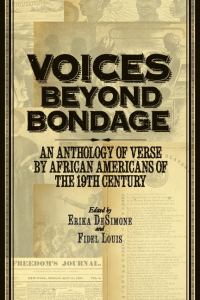
Slaves in chains, toiling on master’s plantation. Beatings, bloodied whips. This is what many of us envision when we think of 19th-century African Americans; source materials penned by those who suffered in bondage validate this picture. Yet slavery was not the only identity of 19th-century African Americans. Whether they were freeborn, self-liberated, or born in the years after the Emancipation, African Americans had a rich cultural heritage all their own, a heritage largely subsumed in popular history and collective memory by the atrocity of slavery.The early 19th century birthed the nation’s first black-owned periodicals, the first media spaces to provide primary outlets for the empowerment of African American voices. For many, poetry became this empowerment. Almost every black-owned periodical featured an open call for poetry, and African Americans, both free and enslaved, responded by submitting droves of poems for publication. Yet until now, these poems — and an entire literary movement — have been lost to modern readers.
The poems in Voices Beyond Bondage address the horrific and the mundane, the humorous and the ordinary and the extraordinary. Authors wrote about slavery, but also about love, morality, politics, perseverance, nature, and God. These poems evidence authors who were passionate, dedicated, vocal, and above all resolute in a bravery which was both weapon and shield against a world of prejudice and inequity. These authors wrote to be heard; more than 150 years later it is at last time for us to listen.
“Voices Beyond Bondage reveals a mostly unacknowledged 19th-century literary movement and gives readers a fresh perspective on African American poets from the antebellum and postbellum periods. The anthology will be valued as a rich resource for libraries, students, and scholars of both literature and history.” — Julian Bond, Chairman Emeritus, NAACP
Empire of Cotton: A Global History, an Illustrated book talk by historian Sven Beckert
Wednesday, January 20, 2016 at 7:30pm
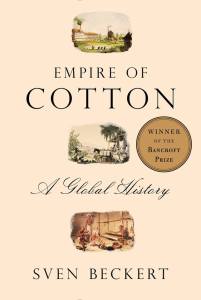
Calling Empire of Cotton one of the five best non-fiction books of 2015, the New York Times wrote, “In this sweeping, ambitious, and disturbing survey, Beckert takes us through every phase of a global industry that has relied on millions of miserably treated slaves, sharecroppers, and mill workers to turn out its product.” Beckert demonstrates how the constant struggle between enslaved people and planters, merchants and statesmen, workers and factory owners ushered in the world of modern capitalism, including the vast wealth and disturbing inequalities that are with us today. His book is as unsettling as it is enlightening.
“Too little present-day academic history is written for the general public. Empire of Cotton transcends this barrier and should be devoured eagerly, not only by scholars and students but also by the intelligent reading public. The book is rich and diverse in the treatment of its subject. The writing is elegant, and the use of both primary and secondary sources is impressive and varied. Overviews on international trends alternate with illuminating, memorable anecdotes. Empire of Cotton proves Sven Beckert one of the new elite of genuinely global historians.” — The Washington Post
About the author: Sven Beckert is the Laird Bell Professor of American History at Harvard University. He researches, writes, and teaches the history of the United States in the nineteenth century, with a particular emphasis on the history of capitalism, including its economic, social, political, and transnational dimensions. With a group of students, he has also worked on the historical connections between Harvard and slavery and published Harvard and Slavery: Seeking a Forgotten History.
American Passage: The Communications Frontier in Early New England, a book talk with Katherine Grandjean, Assistant Professor of History at Wellesley College
Wednesday, November 18 at 7:30pm
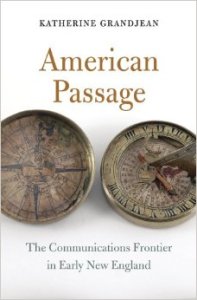
New England was built on letters. Its colonists left behind thousands of them, brittle and browning and crammed with curls of purplish script. How they were delivered, though, remains mysterious. We know surprisingly little about the way news and people traveled in early America. No postal service or newspapers existed—not until 1704 would readers be able to glean news from a “public print.” But there was, in early New England, an unseen world of travelers, rumors, movement, and letters. Unearthing that early American communications frontier, American Passage retells the story of English colonization as less orderly and more precarious than the quiet villages of popular imagination.
The English quest to control the northeast entailed a great struggle to control the flow of information. Even when it was meant solely for English eyes, news did not pass solely through English hands. Algonquian messengers carried letters along footpaths, and Dutch ships took them across waterways. Who could travel where, who controlled the routes winding through the woods, who dictated what news might be sent—in Katherine Grandjean’s hands, these questions reveal a new dimension of contest and conquest in the northeast. Gaining control of New England was not solely a matter of consuming territory, of transforming woods into farms. It also meant mastering the lines of communication.
Read a Boston Globe interview with Katherine Grandjean about early European colonists’ engagement of Native American couriers to send messages over long distances: https://www.bostonglobe.com/ideas/2015/03/08/colonists-sent-letters-native-american-messengers-says-new-book/Db0GNmgX5a4IoiOBn0shkI/story.html
“Compelled to Servitude”: The Story of Belinda, performances by storyteller Tammy Denease
Saturday, October 3, 2015; performances at noon and 3 pm
Renowned storyteller Tammy Denease interpreted the story of Belinda — whose eloquent 1783 petition to the Massachusetts legislature for a pension from the estate of Isaac Royall Jr. is among the earliest narratives by an African American woman — on the site where this strong woman lived and worked. Each performance lasted about 45 minutes. The first known documentation of Belinda, a woman enslaved by the Royall family, occurs in 1768, when her son and daughter were baptized in Medford, Massachusetts. In February 1783, in the wake of the American Revolution, Belinda successfully petitioned the Massachusetts General Court for a pension for herself and her infirm daughter from the proceeds of Isaac Royall’s estate. She would go on to petition the legislature five more times over the next ten years in her effort to secure payment of what she was owed for a lifetime of servitude. Belinda’s petition has inspired poets and fascinated historians. It has been seen by some commentators as the first call for reparations for American slavery. And it opens a rare window onto the life of an enslaved woman in colonial North America.
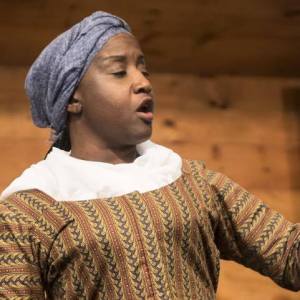
Tammy Denease is uniquely qualified to explore and interpret what we know of Belinda and the turbulent times in which she lived. As a storyteller, teaching artist, and living historian, Ms. Denease gives voice to African-American women whose contributions to the American past are all too often obscured in the traditional historical record. Ms. Denease brought her interpretation of the life of Elizabeth “Mum Bett” Freeman to the Royall House and Slave Quarters for two exciting performances in 2014, and premiered her interpretation of Belinda at the museum’s annual Giving Voice benefit event in June.
Co-sponsored by Historic New England.
This program was funded in part by the New England States Touring program of the New England Foundation for the Arts, made possible with funding from the National Endowment for the Arts Regional Touring Program and the six New England state arts agencies. This event was part of Arts Across Medford, a month-long festival curated by CACHE. Photo courtesy GildartPhoto.com.
African American Faces of the Civil War: Illustrated book talk by Ronald S. Coddington
Wednesday, September 16 at 7:30pm
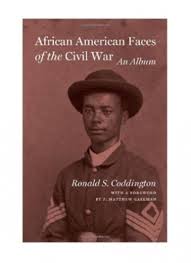
During the Civil War, 200,000 African American men enlisted in the Union army or navy. Some of them were free men and some escaped from slavery; others were released by sympathetic slaveholders to serve the war effort. “African American Faces of the Civil War” tells the story of the Civil War through the images of men of color who served in roles that ranged from servants and laborers to enlisted men and junior officers.
Photograph collector/historian Coddington discovered these portraits— cartes de visite, ambrotypes, and tintypes—in museums, archives, and private collections. He has pieced together each individual’s life and fate based upon personal documents, military records, and pension files. These stories tell of ordinary men who became fighters, of the prejudice they faced, and of the challenges they endured.
Co-sponsored by the Medford Historical Society & Museum and The Friends of the Medford Public Library.
The program is supported in part by the Medford Arts Council, a local agency supported by the Massachusetts Cultural Council, a state agency.
Boston Middle Passage Remembrance Ceremony
Sunday, August 23, 2015 at 3:00pm – 5:00pm; at Faneuil Hall – The Great Hall
Between 1619 and 1865, millions of Africans were transported to North America as part of the slave trade. The Middle Passage was the seaborne nightmare of Africans taken into slavery and shipped to the Americas, many landing at slave ports along the Atlantic, including Boston. Some succumbed to sickness and death from injuries, disease, rebellion, and heartbreak and were thrown overboard; some killed their own children as an act of mercy as they journeyed from their homes to enslavement in a hostile world.
On August 23, 2015, at 3:00 PM, The National Parks of Boston and the Boston Middle Passage Port Ceremony Committee hosted an intergenerational, interfaith ceremony at Faneuil Hall recognizing Boston as a Middle Passage port site. The Boston Middle Passage Port Ceremony brings together historical and cultural organizations, schools, churches and community groups to recognize Boston as a port which received enslaved people and the vital role that Africans and their descendants played in the development of the Massachusetts Bay Colony and the United States.
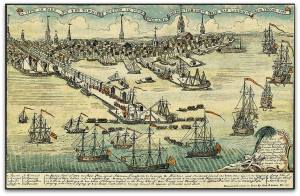
The date of the ceremony symbolizes the global nature of the African diaspora and its members’ struggles for freedom–August 23 is recognized by The United Nations as an international day of remembrance for the transatlantic slave trade because on that day in 1804, Haiti achieved independence.
“Why This Matters: Interpreting Slavery at Museums and Historic Sites,” Book Talk by Kristin Gallas and James DeWolf Perry
Wednesday, May 6, 2015 at 7:00pm – 8:30 pm
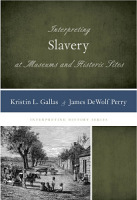
May 6 was spent celebrating the launch of “Interpreting Slavery at Museums and Historic Sites,” a new book from Rowman & Littlefield Publishers. Editors Kristin Gallas and James DeWolf Perry, of the Tracing Center on Histories and Legacies of Slavery, will be on hand to talk about why the history of slavery in the United States is important and relevant to our communities, how historic sites and museums can facilitate the sharing of these stories, and how they tie into vital contemporary public debates.
Signed copies of “Interpreting Slavery at Museums and Historic Sites” are available for purchase in the museum gift shop.
“The Logbooks: Connecticut’s Slave Ships and Human Memory,” Book talk by journalist Anne Farrow, co-author of Complicity: How the North Promoted, Prolonged and Profited from Slavery
Wednesday, April 15, 2015 at 7:30 p.m.
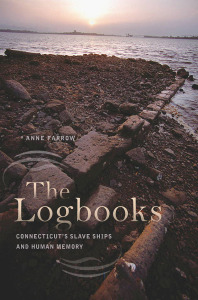
In 1757, a ship owned by an affluent Connecticut merchant sailed from New London to the tiny island of Bence in Sierra Leone, West Africa, to take on fresh water and captives. On board was the owner’s son, on a training voyage to learn the trade. The Logbooks explores that voyage to unearth new realities of Connecticut’s slave trade and question how we could have forgotten this part of our past so completely.
“The story of slavery in New England is like a landscape that you learn to see,” says Anne Farrow. “Once you begin to see these great seaports and these great historic houses, everywhere you look, you can follow it back to the agricultural trade of the West Indies, to the trade of bodies in Africa, to the unpaid labor of black people.”
Journalist Anne Farrow is a co-author of Complicity: How the North Promoted, Prolonged and Profited from Slavery and a former reporter and editor for the Hartford Courant.
Signed copies of The Logbooks are available for purchase in the museum gift shop.
“Boston: Origin of American Slavery,” Illustrated Talk by Journalists Lisa Braxton and Alex Reid
Wednesday, March 18th, 2015 at 7:30 pm
Captain William Pierce piloted his ship Desire toward Boston into the inner harbor as onlookers watched from the frozen shoreline. It was February 1638. Like the Mayflower voyage many years earlier, the Desire carried passengers who would begin new lives in the New World. But these people were not Puritans or their countrymen. They were people of a different sort. They were African-born people, now enslaved.
Built in a Marblehead shipyard, the Desire was the first American-built slave ship in our national history. Up to this moment, slavery had been a European enterprise. But the Desire’s arrival in Boston Harbor that cold day was a historic moment, for it presaged Boston’s age of slavery and the laws and social customs that encouraged the buying and selling of human beings until well after the Revolutionary War.

About the authors: The husband-and-wife team Alex Reid and Lisa Braxton have significant journalism experience. Lisa Braxton earned her Master of Science degree in journalism from Northwestern University and her Master of Fine Arts degree in creative writing from Southern New Hampshire University. She is a former television and newspaper journalist and former president of the Boston chapter of the Women’s National Book Association. She has had short stories and essays published in books and journals, including Vermont Literary Review, Foliate Oak Literary Magazine, Clockhouse Review, and Chicken Soup for the Soul. She has completed work on a novel which has yet to be published.Alex Reid is a journalist and former reporter for the New York Times, Philadelphia Daily News, and The Boston Globe. He has a degree in journalism from Boston University, where he also taught journalism. A native of Petersburg, Virginia, Alex is currently Associate Director of Public Relations at Tufts University where he has worked for more than seven years.
“Boston and the Civil War: Hub of the Second Revolution,” Lecture by Historian Barbara Berenson
Wednesday, January 21, 2015 at 7:30pm
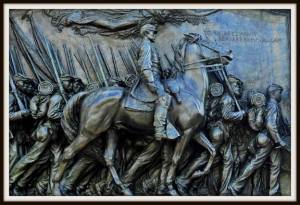
Join local historian and author Barbara F. Berenson for this discussion of her new book. Boston’s black and white abolitionists forged a second American revolution dedicated to ending slavery and honoring the promise of liberty made in the Declaration of Independence. Before the war, Bostonians were bitterly divided between those who supported the Union and those opposed to its endorsement of slavery. The Fugitive Slave Act brought the horrors of slavery close to home and led many to join the abolitionists. March to war with Boston’s brave soldiers, including the grandson of Patriot Paul Revere and the Fighting Irish. The all-black Fifty-fourth Massachusetts Regiment battled against both slavery and discrimination, while Boston’s women fought tirelessly against slavery and for their own right to be full citizens of the Union.
About the speaker: Barbara F. Berenson is the author of Walking Tours of Civil War Boston: Hub of Abolitionism and co-editor of Breaking Barriers: The Unfinished Story of Women Lawyers and Judges in Massachusetts. A graduate of Harvard College and Harvard Law School, where she became interested in the Royall family’s Harvard connection, Barbara works as a senior attorney at the Massachusetts Supreme Judicial Court.
“And She Will Ever Pray: Finding Belinda Royall,” Illustrated Talk by Writer Richard Douglass-Chin
Wednesday, November 19, 2014 – 7:30 p.m.
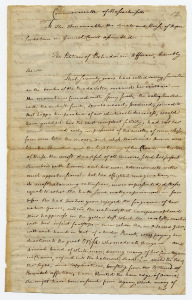
Belinda Royall’s voice echoes down the ages through the survival of her petition to the Legislature of Massachusetts in 1783 requesting a pension for her aged self and her infirm daughter, from the proceeds of her deceased master Isaac Royall Jr.’s estate. Belinda ends her request with the determined vow that, for the monies owed her, “she will ever pray.” Piecing together the fragments of information we have about her, Richard Douglass-Chin, professor of English at the University of Windsor, Ontario, will recreate the story of the remarkable Belinda Royall — an epic journey spanning nearly sixty years.
“Tracing Our Faces” Project Launches November 13th at Medford City Hall
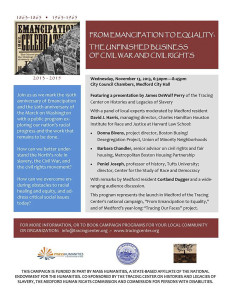
The Royall House & Slave Quarters is a proud collaborator on Medford’s new “Tracing Our Faces” project, a year-long series marking the 150th anniversary of the Emancipation Proclamation and the 50th anniversary of the March on Washington. “From Emancipation to Equality: The Unfinished Business of Civil War and Civil Rights” launched the project on Wednesday, November 13th at 6:30pm at Medford City Hall, with presentations and community discussion. Monthly events throughout 2014 provided opportunities for our community to consider Medford’s long history in the context of civil rights, to explore the legacies of these landmark events, and to work together to address critical issues of importance to the people of Medford. This project was co-sponsored by the Tracing Center on Histories and Legacies of Slavery, the Medford Human Rights Commission, and the Medford Commission for Persons with Disabilities. The planning team also includds representatives of Tufts University, Medford Public Library, Medford Historical Society, and the Mystic Valley Area Branch of the NAACP.
“Songs of Slavery,” Free Performance by the US Slave Song Chorus
Sunday, August 3, 2014 at 4:00pm – 5:00pm
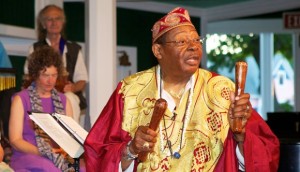
This free concert by the US Slave Song Project Inc, held on the Royall House & Slave Quarters museum grounds, is co-sponsored by The Friends of the Medford Public Library and part of the year-long Medford Tracing Our Faces project.
The U.S. Slave Song Project, based in Oak Bluffs on Martha’s Vineyard, is a nonprofit organization dedicated to educating the public about the authentic American folk music known as slave songs or spirituals. Under the direction of founder Jim Thomas, the chorus will perform songs that enabled enslaved African-Americans to communicate with one another, teach their children, record their history, and heal their pain.
The Royall House & Slave Quarters is open for guided tours on the hour at 1, 2, and 3pm, every Saturday and Sunday. Please join us for a tour before the concert begins.
“One Minute’s Freedom: The Story of Mum Bett,” by Storyteller Tammy Denease
Saturday, May 31, 2014 – 11:00 a.m. & 3:00 p.m.
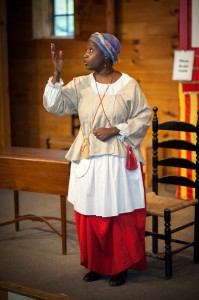
“One Minute’s Freedom” will introduce school-aged children to the brave woman who helped end slavery in Massachusetts. Story-teller Tammy Denease brings to life Elizabeth Freeman – a remarkable heroine known as Mum Bett or Mumbet – who successfully sued for freedom from slavery in western Massachusetts in 1781.
Mum Bett was known for having the courage to speak what was in her heart and to stand up for those who could not stand for themselves. “Anytime, anytime while I was a slave, if one minute’s freedom had been offered to me, and I had been told I must die at the end of that minute, I would have taken it—just to stand one minute on God’s airth [earth] a free woman—I would.”
Co-sponsored by Historic New England, this special program for children ages 7 and up is supported in part by a grant from the Medford Arts Council, a local agency which is supported by the Massachusetts Cultural Council, a state agency.
Each performance will last approximately 45 minutes. These programs will be held in conjunction with our annual Community Open House. The mansion and slave quarters will be open to visitors from 12-3 p.m.
“Ebony and Ivy: Race, Slavery, and the Troubled History of America’s Universities,” Lecture by historian Craig Steven Wilder
Wednesday, April 16, 2014 – 7:30 p.m.
In his important and widely reviewed new study, Professor Wilder argues that many of America’s revered colleges and universities were soaked in the sweat, the tears, and sometimes the blood of people of color. The earliest academies proclaimed their mission to Christianize the savages of North America, and played a key role in white conquest. Later, the slave economy and higher education grew up together, each nurturing the other. Slavery funded colleges, built campuses, and paid the wages of professors. Enslaved Americans waited on faculty and students; academic leaders aggressively courted the support of slave owners and slave traders. Significantly, our leading universities, dependent on human bondage, became breeding grounds for the racist ideas that sustained them.
Craig Steven Wilder is professor of American history at MIT, and has taught at Williams College and Dartmouth College. Wilder grew in Brooklyn’s Bedford-Stuyvesant neighborhood and received his PhD from Columbia University. He is the author of A Covenant with Color and In the Company of Black Men.
“Uncovering African American Stories at Historic New England,” Illustrated Lecture by Historian Jennifer Pustz
Wednesday, February 19, 2014 – 7:30 p.m.
Though too often hidden, the contributions of African Americans, enslaved and free, are important to understanding the history of New England. The story of Prince Sayward of York, Maine, who fought in the American Revolution, and that of Cuff Gardner, a free African American who worked at Rhode Island’s Casey Farm at the turn of the nineteenth century, reveal new aspects of daily life at these sites. These stories are about labor, but also about these individuals’ participation in the fight for freedom and in such uniquely New England traditions as “Negro Elections.”
Jennifer Pustz is museum historian at Historic New England, author of Voices from the Back Stairs: Interpreting Servants’ Lives at Historic House Museums, and a member of the Royall House and Slave Quarters board of directors. She has a Ph.D. in American Studies from the University of Iowa. Historic New England is a museum of cultural history that collects and preserves buildings, landscapes, and objects dating from the seventeenth century to the present and uses them to keep history alive and to help people develop a deeper understanding and enjoyment of New England life and appreciation for its preservation.
Two Public Programs Exploring Life in Colonial New England
Mehetabel Coit and Joshua Hempstead were next-door neighbors in 18th-century New London, Connecticut. Both kept detailed diaries about their everyday lives, and fortuitously both diaries survive. These diaries inspired two recent thoughtful and revealing histories of life in colonial New England. Please join us in November and again in January for public programs featuring the authors of these two fascinating titles.
“One Colonial Woman’s World: The Life and Writings of Mehetabel Chandler Coit,” Illustrated Book Talk by Historian Michelle Coughlin
Wednesday, November 20, 2013 – 7:30 p.m.
Coughlin’s 2012 book reconstructs the life of Mehetabel Chandler Coit (1673–1758), based on what may be the earliest surviving diary by an American woman. A native of Roxbury, Massachusetts, who later moved to New London, Connecticut, Mehetabel began her diary at the age of fifteen and kept it intermittently until she was well into her seventies.
A previously overlooked resource, the diary contains entries on a broad range of topics as well as poems, recipes, folk and herbal medical remedies, religious meditations, financial accounts, and even some humor. An extensive collection of letters by Mehetabel and her female relatives has also survived, shedding further light on her experiences.
Michelle Marchetti Coughlin is an independent scholar and former editor who holds graduate degrees in history and in English and American Literature. She is currently working on an article about a poem by Mehetabel’s mother.
Copies of One Colonial Woman’s World: The Life and Writings of Mehetabel Chandler Coit will be available for purchase and signing at the event.
“For Adam’s Sake: A Family Saga in Colonial New England,” Illustrated Book Talk by Historian Allegra di Bonaventura
Wednesday, January 15, 2014 – 7:30 p.m.
Joshua Hempstead was a well-respected farmer and tradesman in New London, Connecticut. As his remarkable diary — kept from 1711 until 1758 — reveals, he was also a slaveholder who held Adam Jackson in bondage for more than thirty years.
In this engrossing narrative of family life and the slave experience in the colonial North, Allegra di Bonaventura describes the complexity of this relationship between slaveholder and enslaved, and traces the intertwining stories of two families until the eve of the Revolution. The lines between slavery and freedom were blurred as colonial New England families across the social spectrum fought to survive. In this enlightening study, a new portrait of the era emerges.
Allegra di Bonaventura is an assistant dean at the Yale Graduate School of Arts and Sciences in New Haven, Connecticut.
Copies of For Adam’s Sake: A Family Saga in Colonial New England will be available for purchase and signing at the event.
Giving Voice – Annual Benefit Event
Featured presentation by James DeWolf Perry, executive director of The Tracing Center on Histories and Legacies of Slavery
Saturday, June 8, 2013 – 3:00-5:00 p.m.
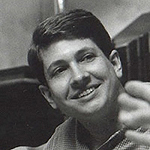
We wish to inform you that James DeWolf Perry, executive director of The Tracing Center on Histories and Legacies of Slavery, will be the guest speaker for this year’s Giving Voice program on Saturday, June 8. Professor Lois Brown of Wesleyan University is unable to be our featured speaker as previously announced due to unforeseen circumstances, but looks forward to participating in a future program. Mr. Perry will continue a tradition of exceptional speakers at this annual event to benefit the Royall House and Slave Quarters.
About the speaker: James DeWolf Perry, executive director of The Tracing Center on Histories and Legacies of Slavery, was nominated for an Emmy award for his role as the principal historical consultant for Traces of the Trade: A Story from the Deep North, a 2008 PBS documentary about the legacy of the northern U.S. role in slavery and the slave trade. Since the film’s premiere, Mr. Perry has spoken across the nation about his family’s, and the nation’s, historic role in slavery, and has facilitated discussions about the legacy of slavery and race at high schools and universities and with corporate, educational, religious and community groups. Mr. Perry attended law school at Columbia University, and his graduate work at Harvard has included research on the transatlantic slave trade and its abolition.
“Master of the Mountain: Thomas Jefferson and His Slaves,” Lecture by Historian Henry Wiencek
Wednesday, May 15, 2013 – 7:30 p.m.
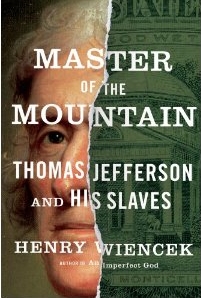
“The very existence of slavery in the era of the American Revolution presents a paradox,” writes journalist/historian Henry Wiencek, “and we have largely been content to leave it at that. Jefferson animates the paradox. And by looking closely at Monticello, we can see the process by which he rationalized an abomination to the point where an absolute moral reversal was reached and he made slavery fit into America’s national enterprise.” Wiencek’s controversial new book suggests that the author of the Declaration of Independence shifted his position on slavery for financial reasons, convinced that the only way to make a success of his debt-ridden plantation was through what he called the “silent profits” gained from those he enslaved.
“The Social Significance of Boston’s Colonial Country Houses,” Illustrated Lecture by Alexander von Hoffman, Harvard University, Graduate School of Design
Wednesday, March 20, 2013 – 7:30 p.m.
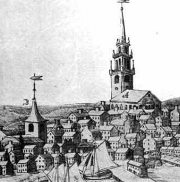
Dr. von Hoffman will explore how the members of Boston’s eighteenth-century elite expanded their social lives into the town’s suburban and rural environs. Fashionably designed country houses are among the most notable and long-lasting artifacts left by these leading Bostonians. The stately homes that still ring Boston include not only the Isaac Royall House in Medford but also the Vassal-Craigie-Longfellow House in Cambridge, the Loring-Greenough House in Jamaica Plain, and the Shirley-Eustis House in Roxbury. The presentation will feature a close look at the architecture of these building and the social context in which they were built, offering lively and accessible insights into this important, but often overlooked, aspect of Boston’s history.
Alexander von Hoffman is a Senior Fellow at the Joint Center for Housing Studies of Harvard University and Lecturer at Harvard’s Graduate School of Design. He is the author of House by House, Block by Block: The Rebirth of America’s Urban Neighborhoods (Oxford University Press, 2003) and a history of Boston’s Jamaica Plain neighborhood, Local Attachments: The Making of an American Urban Neighborhood, 1850 to 1920 (Johns Hopkins University Press, 1994). Dr. Von Hoffman has published scholarly articles on urban history and essays on housing and cities for the Atlantic Monthly, the New York Times, the Washington Post, and the Boston Globe, and delivered public lectures in cities across the United States. He received a Ph.D. in history from Harvard University in 1986.
“Beans and Bacon and Hasty Pudding (But It’s Not Just the Food),” Talk by Culinarian Kathleen Wall
Wednesday, January 16, 2013 – 7:30 p.m.

On Wednesday, January 16, 2013, at 7:30 p.m., Plimoth Plantation’s colonial foodways culinarian Kathleen Wall will present a lecture on Beans and Bacon and Hasty Pudding (But It’s Not Just the Food), exploring eighteenth-century cuisine with a focus on what would have been eaten by the Massachusetts colony’s wealthiest residents and by those they enslaved.
The Royalls drank punch, coffee, tea, and chocolate from imported porcelain cups specifically made for each beverage, and European wines from bottles stamped with their family seal. Their kitchen was equipped with the very latest in food preparation equipment, and they bought lemons and oysters for festive occasions. But what did they eat for everyday meals, and what would the estate’s dozens of enslaved Africans have eaten? The history of food is central to our understanding of the daily lives and social systems of the past.
Kathleen Wall has been on staff at Plimoth Planatation since 1980. As the museum’s Colonial Foodways Culinarian, she trains, lectures, and demonstrates period foodways techniques and history for staff and guests. Recent media appearances include The History Channel, Food Network, National Public Radio, and the Victory Garden. She is a member of the Culinarian Historians of Boston, and blogs about colonial-era foods at Pilgrim Seasonings for Plimoth Plantation.
“Penelope Royall, Cuba Vassall, and the Families of Tory Row,” Talk by Historian J. L. Bell
Wednesday, November 14, 2012 – 7:30 p.m.
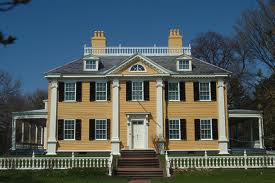
In 1741 Penelope Royall married Henry Vassall, a younger son in a family with even more wealth from Caribbean sugar plantations than her own. She moved to Cambridge, taking with her the enslaved young woman, Cuba, whom she had inherited from her father, Isaac Royall Sr. Widowed in 1769, Penelope sold Cuba to her nephew John Vassall, who lived across the street in the mansion now known as Longfellow House – Washington’s Headquarters National Historic Site. This illustrated lecture by historian J. L. Bell will explore the Vassalls’ “Tory Row” neighborhood, how those families reacted when Revolutionary politics intruded in 1774, and Cuba Vassall’s life in the new republic.
J. L. Bell maintains the Boston 1775 website, which offers daily updates of history, analysis, and unabashed gossip about Revolutionary New England. He has recently completed a book-length study of Washington’s headquarters in Cambridge, starting with the John Vassall household. Mr. Bell has spoken at many historic sites around Boston, and has written articles on Revolutionary boys, town watchmen at the Massacre, and General Washington’s first spies.


